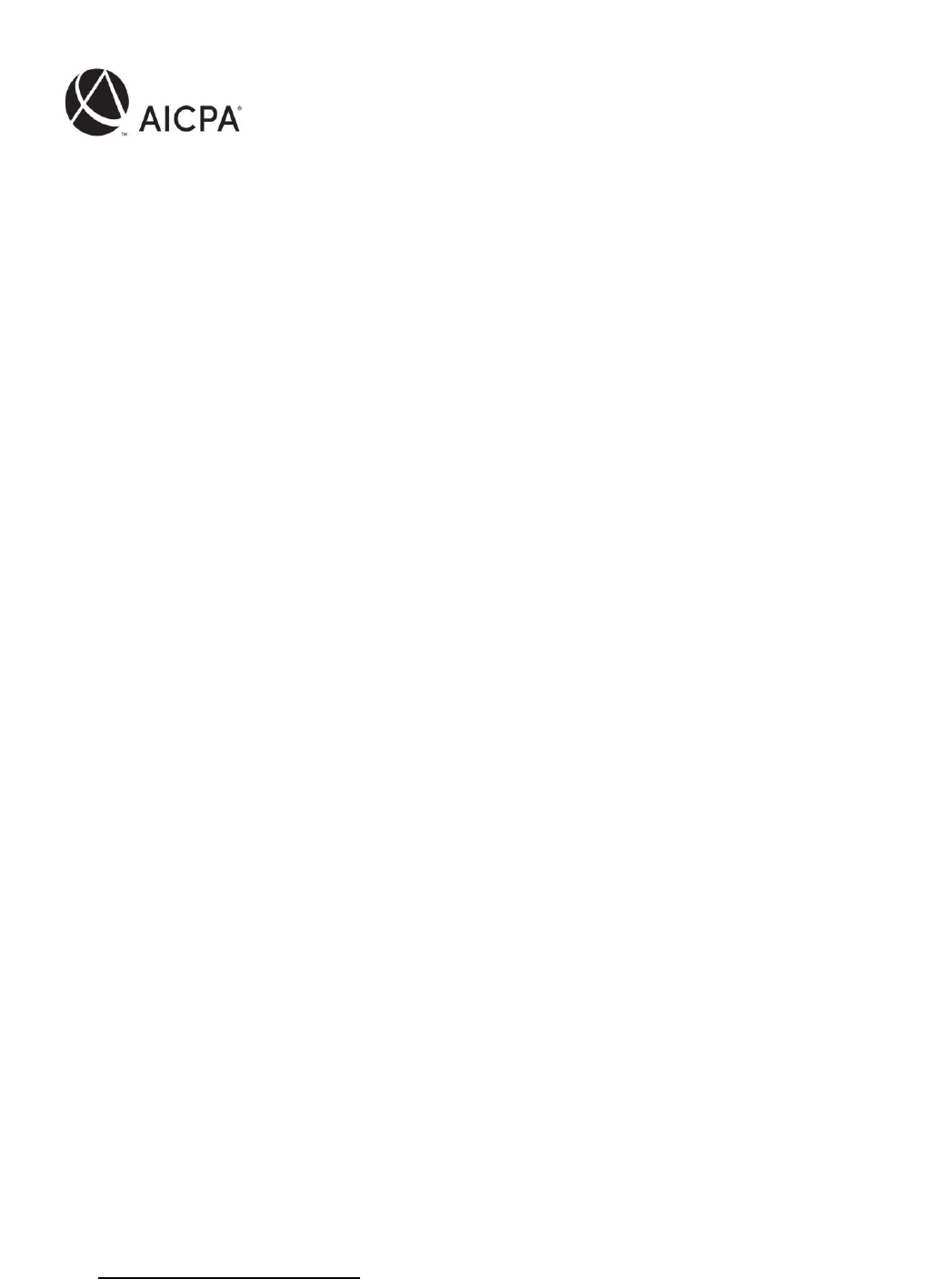
© 2021 AICPA. All rights reserved.
A U GUS T 2 0 2 1
Employee Benefit Plans Industry FAQ with
Illustrative Auditor’s Reports for Initial Year
of Implementation of SAS No. 136, as
Amended
The following frequently asked question (FAQ) and illustrative auditor’s reports have been developed to
aid practitioners as they apply AICPA Statement on Auditing Standards (SAS) No. 136, Forming an
Opinion and Reporting on Financial Statements of Employee Benefit Plans Subject to ERISA, as amended,
in their audits of financial statements of employee benefit plans subject to the Employee Retirement
Income Security Act of 1974 (ERISA) in the initial year of implementation.
This document was prepared by AICPA staff to provide nonauthoritative guidance on applying SAS No.
136, as amended in the initial year of implementation. These illustrative auditor’s reports represent the
views of AICPA staff based on the input of members of the AICPA Employee Benefit Plans Expert Panel;
they have not been approved, disapproved or otherwise acted upon by a senior committee of the
AICPA.
Auditor’s Reports for Initial Year of Implementation of SAS No. 136, as Amended
Question — What Will the Auditor’s Report Look Like When Implementing the EBP SAS in the
First Year?
Statement on Auditing Standards (SAS) No. 136, Forming an Opinion and Reporting on Financial
Statements of Employee Benefit Plans Subject to ERISA, as amended (hereinafter referred to as the EBP
SAS in this document), prescribes certain new performance requirements for an audit of financial
statements of employee benefit plans subject to the Employee Retirement Income Security Act of 1974
(ERISA) and changes the form and content of the related auditor’s report. It should not be adapted for
plans that are not subject to ERISA. The EBP SAS has been codified in AU-C section 703, Forming an
Opinion and Reporting on Financial Statements of Employee Benefit Plans Subject to ERISA,
1
and is
effective for audits of financial statements for periods ending on or after December 15, 2021, with early
1
All AU-C sections can be found in AICPA Professional Standards.
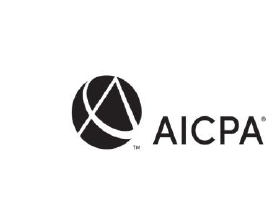
© 2021 AICPA. All rights reserved.
implementation permitted. Because ERISA requires that certain comparative financial statements be
presented, what will the auditor’s report look like when implementing the EBP SAS in the first year?
Reply
Exhibit B of the EBP SAS addresses what the auditor’s report could look like in the initial year of
implementation of the EBP SAS for a continuing auditor when the auditor performed a limited-scope
audit (disclaimer of opinion) in the prior year and an ERISA Section 103(a)(3)(C) audit in the current year.
Exhibit B of the EBP SAS illustrates when the auditor issues two separate reports in the year of
implementation. The current year is an ERISA Section 103(a)(3)(C) report and the prior year is a
disclaimer of opinion, both of which have the same report date because the auditor updates the prior
year report (see paragraph .86 of AU-C section 703 for discussion about updating the report). When
illustration B-1 in exhibit B of the EBP SAS was developed, early implementation of the EBP SAS was not
permitted. Subsequently, SAS No. 141, Amendment to the Effective Dates of SAS Nos. 134−140, changed
the effective date and permitted early implementation.
Illustrations for Reporting in the Year of Implementation of the EBP SAS Under Various Scenarios
The following illustrations provide the auditor with options for reporting in the year of implementation
of the EBP SAS under various scenarios. Each illustration includes additional circumstances that are
unique to that illustration. The illustrations have been developed for informational purposes and have
no authoritative status; however, they may help the auditor understand and apply the EBP SAS. For all
illustrations, the following circumstances apply.
• The audit is for a complete set of general purpose financial statements for a 401(k) plan subject
to ERISA that is presenting comparative statements of net assets available for benefits and a
single-year statement of changes in net assets available for benefits.
• Management is responsible for the preparation of the financial statements in accordance with
accounting principles generally accepted in the United States of America, as promulgated by the
FASB.
• The terms of the audit engagement reflect the description of management's responsibility for
the financial statements in AU-C section 210, Terms of Engagement, and AU-C section 703.
• Except for illustration 1−5, there are no limitations on the scope of the audit for the current year,
and the auditor has not identified any material misstatements of the ERISA plan financial
statements.
• Based on the audit evidence obtained, the auditor has concluded that there are no conditions or
events, considered in the aggregate, that raise substantial doubt about the plan's ability to
continue as a going concern for a reasonable period of time in accordance with AU-C section
570, The Auditor's Consideration of an Entity's Ability to Continue as a Going Concern.
• The auditor has not been engaged to communicate key audit matters.
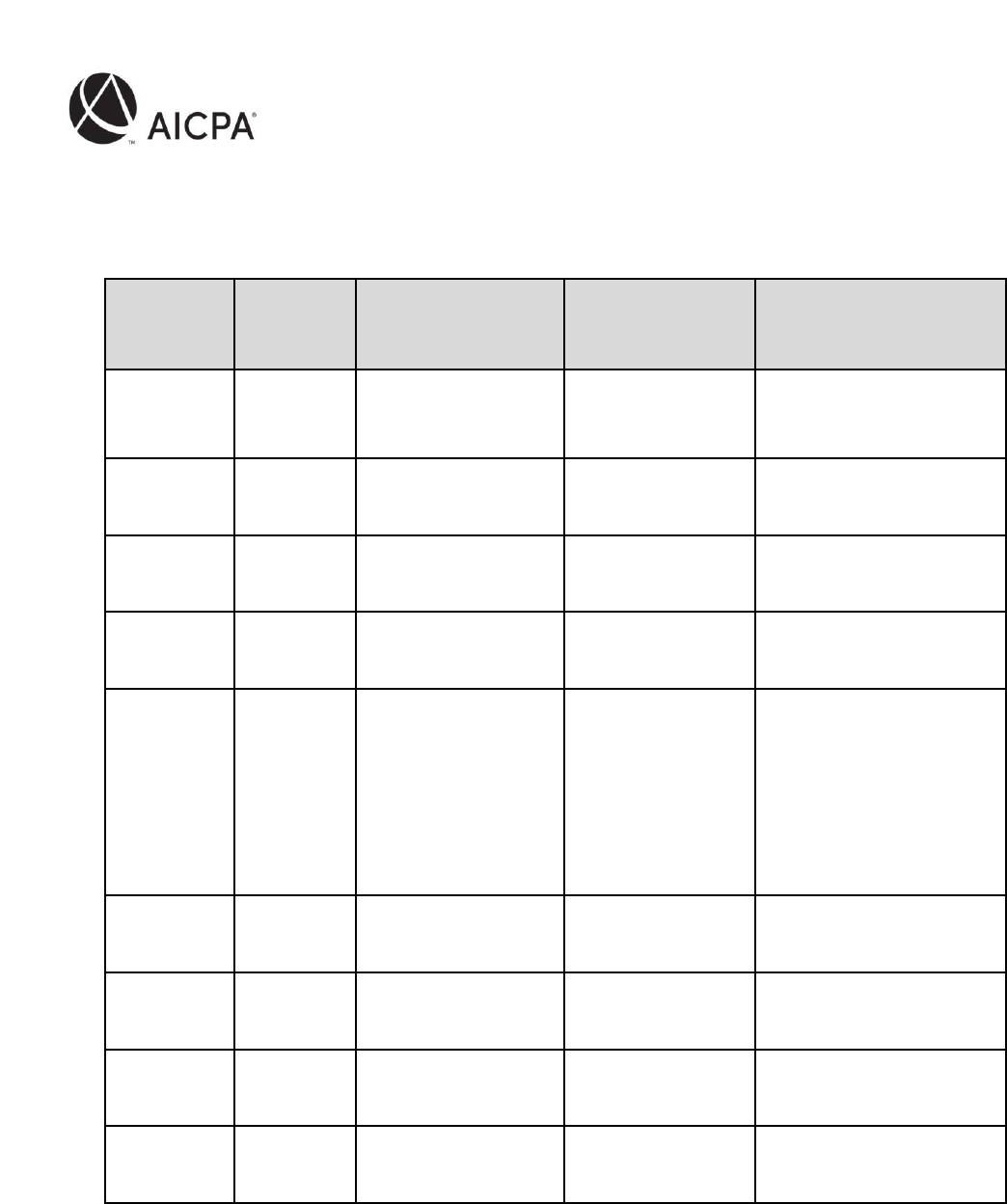
© 2021 AICPA. All rights reserved.
The following table summarizes the example reports illustrated.
Illustration
No.
Type of
plan
Current year (2021) –
type of audit
Prior year (2020) –
type of audit
Conditions
1-1
401(k)
ERISA Section
103(a)(3)(C)
Limited scope
Continuing auditor
1-2
401(k)
ERISA Section
103(a)(3)(C)
Full scope
Continuing auditor
1-3
401(k)
Non-Section
103(a)(3)(C)
Limited scope
Continuing auditor
1-4
401(k)
Non-Section
103(a)(3)(C)
Full scope
Continuing auditor
1-5
403(b)
ERISA Section
103(a)(3)(C) with a
limitation on the
scope of the audit
Limited scope with
respect to
investment
information and
additional
limitation on the
scope of the audit
Continuing auditor
1-6
401(k)
ERISA Section
103(a)(3)(C)
Limited scope
Prior period audited by
predecessor auditor
1-7
401(k)
ERISA Section
103(a)(3)(C)
Full scope
Prior period audited by
predecessor auditor
1-8
401(k)
Non-Section
103(a)(3)(C)
Limited scope
Prior period audited by
predecessor auditor
1-9
401(k)
Non-Section
103(a)(3)(C)
Full scope
Prior period audited by
predecessor auditor
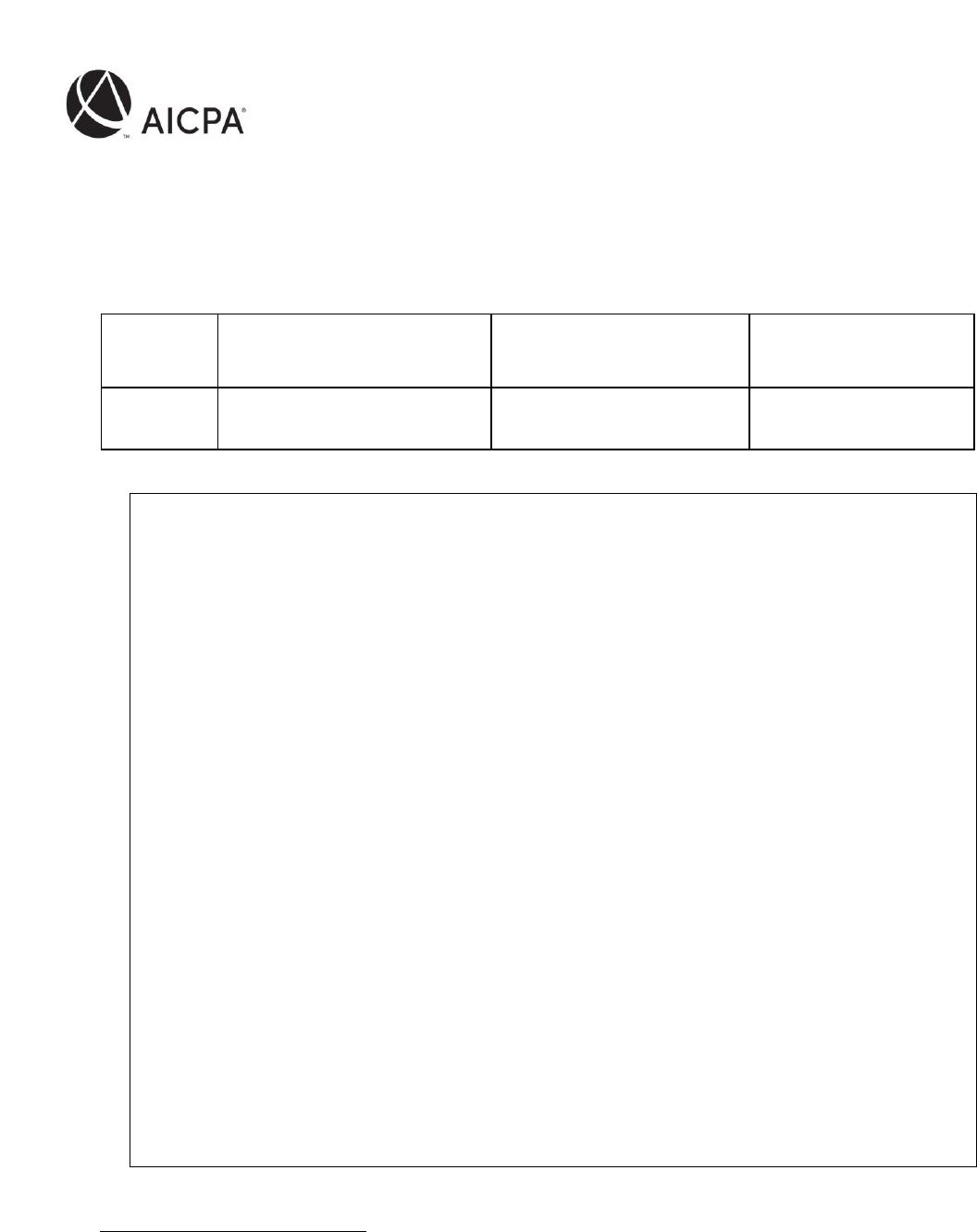
© 2021 AICPA. All rights reserved.
Continuing Auditor Situations
Illustration 1-1
Type of
plan
Current year (2021) – type of
audit
Prior year (2020) – type of
audit
Conditions
401(k)
ERISA Section 103(a)(3)(C)
Limited scope
(disclaimer of opinion)
Continuing auditor
Circumstances include the following:
• Management elected an ERISA Section 103(a)(3)(C) audit for the 2021 plan year financial
statements as permitted by Code of Federal Regulations (CFR), Labor, Title 29, Section 2520.103-8
of the Department of Labor's Rules and Regulations for Reporting and Disclosure under ERISA.
2
• The auditor performed an ERISA Section 103(a)(3)(C) audit as of and for the year ended December
31, 2021 in accordance with GAAS. The auditor has implemented SAS Nos. 134−140 for the
December 31, 2021 plan year.
• The auditor has concluded that the ERISA Section 103(a)(3)(C) report is appropriate as of and for
the year ended December 31, 2021 based on the audit evidence obtained.
• The auditor performed a limited-scope audit and disclaimed an opinion on the prior year financial
statements (for the year ended December 31, 2020).
• Rather than issue two reports as illustrated in exhibit B of AU-C section 703, the auditor is issuing
one report and referring to the prior year (2020) report in an other-matter paragraph in the
current year (2021) report. In such situations, the auditor typically requests plan management to
provide written representations for both years (see paragraph .A127 of AU-C section 703).
• The report on the 2021 ERISA-required supplemental schedules is presented as an other-matter
paragraph in accordance with paragraph .132 of AU-C section 703. The auditor has concluded
that the form and content of the supplemental schedules, other than the information in the
supplemental schedules that agreed to or is derived from the certified investment information, is
presented, in all material respects, in conformity with the Department of Labor's Rules and
Regulations for Reporting and Disclosure under ERISA. The information in the supplemental
schedules related to assets held by and certified to by a qualified institution agreed to or is
derived from, in all material respects, the information prepared and certified by an institution that
management determined meets the requirements of ERISA Section 103(a)(3)(C).
2
Although not as common, an ERISA Section 103(a)(3)(C) audit may relate to the audit of a 103-12 entity as
permitted by Title 29, Labor, U.S. Code of Federal Regulations, Section 2520.103-12 of the Department of Labor's
Rules and Regulations for Reporting and Disclosure under ERISA. Accordingly, the wording in this illustrative report
may need to be revised to fit the circumstances of the engagement.
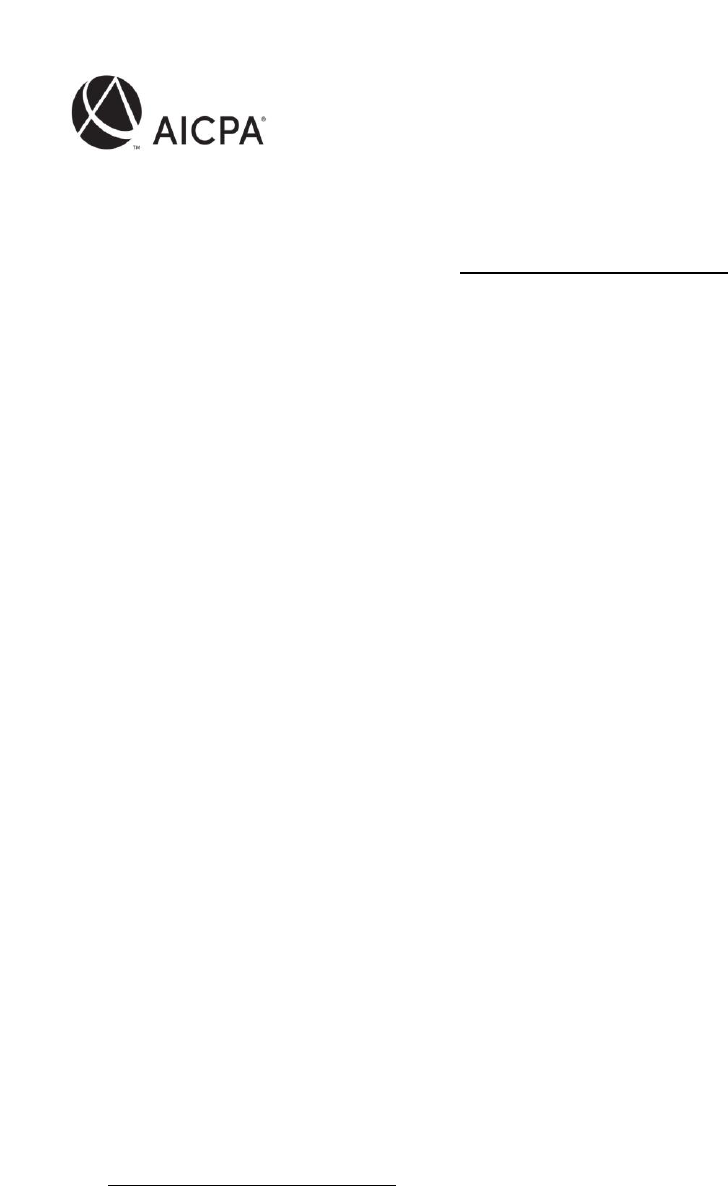
© 2021 AICPA. All rights reserved.
Independent Auditor's Report
[Appropriate Addressee]
Scope and Nature of the ERISA Section 103(a)(3)(C) Audit for the 2021 Financial Statements
3
We have performed an audit of the financial statements of ABC 401(k) Plan, an employee benefit
plan subject to the Employee Retirement Income Security Act of 1974 (ERISA), as permitted by ERISA
Section 103(a)(3)(C) (ERISA Section 103(a)(3)(C) audit). The financial statements comprise the
statement of net assets available for benefits as of December 31, 2021, and the related statement of
changes in net assets available for benefits for the year then ended, and the related notes to the
financial statements (2021 Financial Statements).
4
Management, having determined it is permissible in the circumstances, has elected to have the
audit of the 2021 financial statements performed in accordance with ERISA Section 103(a)(3)(C)
pursuant to 29 CFR 2520.103-8 of the Department of Labor's Rules and Regulations for Reporting
and Disclosure under ERISA. As permitted by ERISA Section 103(a)(3)(C), our audit need not extend
to any statements or information related to assets held for investment of the plan (investment
information) by a bank or similar institution or insurance carrier that is regulated, supervised, and
subject to periodic examination by a state or federal agency, provided that the statements or
information regarding assets so held are prepared and certified to by the bank or similar institution
or insurance carrier in accordance with 29 CFR 2520.103-5 of the Department of Labor's Rules and
Regulations for Reporting and Disclosure under ERISA (qualified institution).
Management has obtained a certification from a qualified institution as of and for the year ended
December 31, 2021, stating that the certified investment information, as described in Note X to the
financial statements, is complete and accurate.
5
Opinion on the 2021 Financial Statements
In our opinion, based on our audit and on the procedures performed as described in the Auditor's
Responsibilities for the Audit of the 2021 Financial Statements section
• the amounts and disclosures in the accompanying 2021 financial statements, other than
those agreed to or derived from the certified investment information, are presented fairly,
in all material respects, in accordance with accounting principles generally accepted in the
United States of America.
3
This illustration reflects the audit of the 2021 financial statements as the first year of implementation of SAS No.
136, Forming an Opinion and Reporting on Financial Statements of Employee Benefit Plans Subject to ERISA, as
amended. The inclusion of the year “2021” throughout this example is for illustrative purposes to easily identify
the period covered. The inclusion of the date is not required. See AU-C section 703, Forming an Opinion and
Reporting on Financial Statements of Employee Benefit Plans Subject to ERISA, for requirements relating to
appropriate headings.
4
The auditor is required to identify the title of each statement that the financial statements comprise. Accordingly,
this illustration would be revised to reflect the specific circumstances of each engagement.
5
If the note to the financial statements does not identify the names of the qualified certifying institutions and
periods covered, then such information may be included in the auditor's report.

© 2021 AICPA. All rights reserved.
• the information in the accompanying 2021 financial statements related to assets held by
6
and certified to by a qualified institution agrees to, or is derived from, in all material
respects, the information prepared and certified by an institution that management
determined meets the requirements of ERISA Section 103(a)(3)(C).
Basis for Opinion on the 2021 Financial Statements
We conducted our audit in accordance with auditing standards generally accepted in the United
States of America (GAAS). Our responsibilities under those standards are further described in the
Auditor's Responsibilities for the Audit of the 2021 Financial Statements section of our report. We
are required to be independent of ABC 401(k) Plan and to meet our other ethical responsibilities, in
accordance with the relevant ethical requirements relating to our audits. We believe that the audit
evidence we have obtained is sufficient and appropriate to provide a basis for our ERISA Section
103(a)(3)(C) audit opinion.
Responsibilities of Management for the 2021 Financial Statements
Management is responsible for the preparation and fair presentation of the financial statements in
accordance with accounting principles generally accepted in the United States of America, and for
the design, implementation, and maintenance of internal control relevant to the preparation and
fair presentation of financial statements that are free from material misstatement, whether due to
fraud or error. Management's election of the ERISA Section 103(a)(3)(C) audit does not affect
management's responsibility for the financial statements.
In preparing the financial statements, management is required to evaluate whether there are
conditions or events, considered in the aggregate, that raise substantial doubt about ABC 401(k)
Plan's ability to continue as a going concern for [insert the time period set by the applicable financial
reporting framework].
7
Management is also responsible for maintaining a current plan instrument, including all plan
amendments, administering the plan, and determining that the plan's transactions that are
presented and disclosed in the financial statements are in conformity with the plan's provisions,
including maintaining sufficient records with respect to each of the participants, to determine the
benefits due or which may become due to such participants.
Auditor’s Responsibilities for the Audit of the 2021 Financial Statements
Except as described in the Scope and Nature of the ERISA Section 103(a)(3)(C) Audit of the 2021
Financial Statements section of our report, our objectives are to obtain reasonable assurance about
6
This sentence may need to be modified when the certification is provided by an insurance entity, which provides
benefits under the plan or holds plan assets.
7
When the financial statements are prepared in accordance with accounting principles generally accepted in the
United States of America as promulgated by FASB, management is required to evaluate whether there are
conditions and events, considered in the aggregate, that raise substantial doubt about an entity’s ability to
continue as a going concern within one year after the date that the financial statements are issued (or within one
year after the financial statements are available to be issued when applicable).
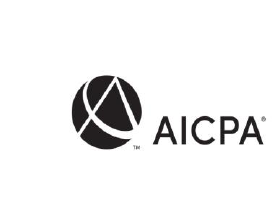
© 2021 AICPA. All rights reserved.
whether the financial statements as a whole are free from material misstatement, whether due to
fraud or error, and to issue an auditor's report that includes our opinion. Reasonable assurance is a
high level of assurance but is not absolute assurance and therefore is not a guarantee that an audit
conducted in accordance with GAAS will always detect a material misstatement when it exists. The
risk of not detecting a material misstatement resulting from fraud is higher than for one resulting
from error, as fraud may involve collusion, forgery, intentional omissions, misrepresentations, or the
override of internal control. Misstatements are considered material if, there is a substantial
likelihood that, individually or in the aggregate, they would influence the judgment made by a
reasonable user based on the financial statements.
In performing an audit in accordance with GAAS, we:
• Exercise professional judgment and maintain professional skepticism throughout the audit.
• Identify and assess the risks of material misstatement of the financial statements, whether
due to fraud or error, and design and perform audit procedures responsive to those risks.
Such procedures include examining, on a test basis, evidence regarding the amounts and
disclosures in the financial statements.
• Obtain an understanding of internal control relevant to the audit in order to design audit
procedures that are appropriate in the circumstances, but not for the purpose of expressing
an opinion on the effectiveness of ABC 401(k) Plan's internal control. Accordingly, no such
opinion is expressed.
• Evaluate the appropriateness of accounting policies used and the reasonableness of
significant accounting estimates made by management, as well as evaluate the overall
presentation of the financial statements.
• Conclude whether, in our judgment, there are conditions or events, considered in the
aggregate, that raise substantial doubt about ABC 401(k) Plan's ability to continue as a going
concern for a reasonable period of time.
Our audit did not extend to the certified investment information, except for obtaining and reading
the certification, comparing the certified investment information with the related information
presented and disclosed in the 2021 financial statements, and reading the disclosures relating to the
certified investment information to assess whether they are in accordance with the presentation
and disclosure requirements of accounting principles generally accepted in the United States of
America.
Accordingly, the objective of an ERISA Section 103(a)(3)(C) audit is not to express an opinion about
whether the financial statements as a whole are presented fairly, in all material respects, in
accordance with accounting principles generally accepted in the United States of America.
We are required to communicate with those charged with governance regarding, among other
matters, the planned scope and timing of the audit, significant audit findings, and certain internal
control-related matters that we identified during the audit.

© 2021 AICPA. All rights reserved.
Other Matters
2021 Supplemental Schedules Required by ERISA
8
The supplemental schedules of [identify the title of supplemental schedules and periods covered],
are presented for purposes of additional analysis and are not a required part of the financial
statements but are supplementary information required by the Department of Labor's Rules and
Regulations for Reporting and Disclosure under ERISA. Such information is the responsibility of
management and was derived from and relates directly to the underlying accounting and other
records used to prepare the financial statements. The information included in the supplemental
schedules, other than that agreed to or derived from the certified investment information, has been
subjected to auditing procedures applied in the audit of the financial statements and certain
additional procedures, including comparing and reconciling such information directly to the
underlying accounting and other records used to prepare the financial statements or to the financial
statements themselves, and other additional procedures in accordance with GAAS. For information
included in the supplemental schedules that agreed to or is derived from the certified investment
information, we compared such information to the related certified investment information.
In forming our opinion on the supplemental schedules, we evaluated whether the supplemental
schedules, other than the information agreed to or derived from the certified investment
information, including their form and content, are presented in conformity with the Department of
Labor's Rules and Regulations for Reporting and Disclosure under ERISA.
In our opinion
• the form and content of the supplemental schedules, other than the information in the
supplemental schedules that agreed to or is derived from the certified investment
information, are presented, in all material respects, in conformity with the Department of
Labor's Rules and Regulations for Reporting and Disclosure under ERISA.
• the information in the supplemental schedules related to assets held by
9
and certified to by
a qualified institution agrees to, or is derived from, in all material respects, the information
prepared and certified by an institution that management determined meets the
requirements of ERISA Section 103(a)(3)(C).
Auditor’s Report on the 2020 Financial Statements
We were engaged to audit the 2020 financial statements of ABC 401(k) Plan. As permitted by 29
CFR 2520.103-8 of the Department of Labor’s Rules and Regulations for Reporting and Disclosure
under ERISA, the plan administrator instructed us not to perform and we did not perform any
8
Paragraph .A14 of AU-C section 706, Emphasis-of-Matter Paragraphs and Other-Matter Paragraphs in the
Independent Auditor’s Report, addresses the placement of emphasis-of-matter and other-matter paragraphs in the
auditor’s report. For purposes of this illustration, this paragraph has been placed at the end of the report. For an
ERISA section 103(a)(3)(C) audit, the auditor is required to report on the ERISA-required supplemental schedules in
an other-matter paragraph.
9
See footnote 5.
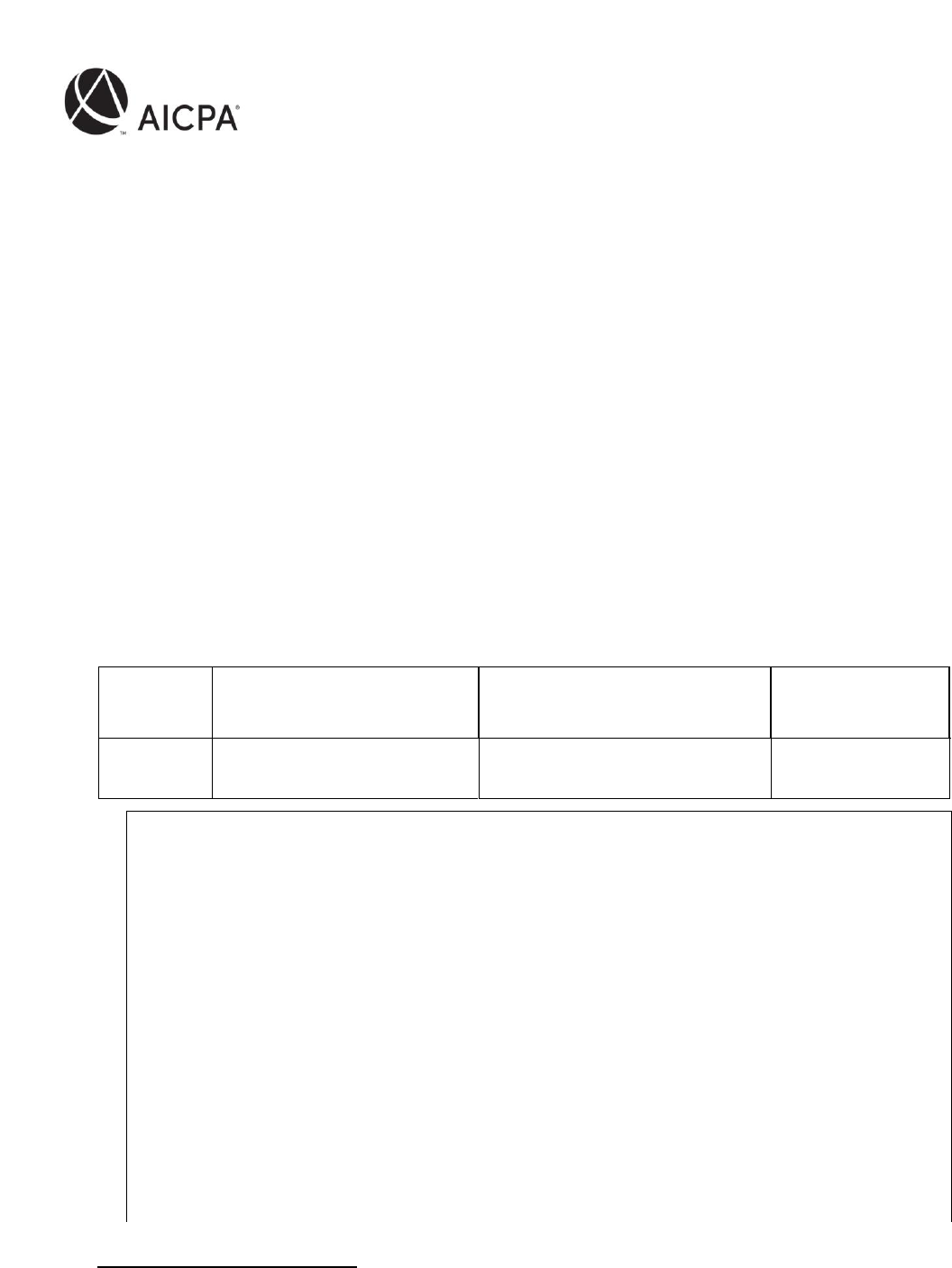
© 2021 AICPA. All rights reserved.
auditing procedures with respect to the information certified by a qualified institution. In our report
dated [insert prior year report date], we indicated that (a) because of the significance of the
information that we did not audit, we were not able to obtain sufficient appropriate audit evidence
to provide a basis for an audit opinion and accordingly, we did not express an opinion on the 2020
financial statements, and (b) the form and content of the information included in the 2020 financial
statements other than that derived from the certified information were presented in compliance
with the Department of Labor’s Rules and Regulations for Reporting and Disclosure under ERISA.
[Signature of the auditor's firm]
[City and state where the auditor's report is issued]
[Date of the auditor's report]
Illustration 1-2
Type of
plan
Current year (2021) – type of
audit
Prior year (2020) – type of audit
Conditions
401(k)
ERISA Section 103(a)(3)(C)
Full scope
(unmodified opinion)
Continuing auditor
Circumstances include the following:
• Management elected an ERISA Section 103(a)(3)(C) audit for the 2021 plan year financial
statements as permitted by Code of Federal Regulations (CFR), Labor, Title 29, Section 2520.103-8
of the Department of Labor's Rules and Regulations for Reporting and Disclosure under ERISA.
10
• The auditor performed an ERISA Section 103(a)(3)(C) audit as of and for the year ended December
31, 2021 in accordance with GAAS. The auditor has implemented SAS Nos. 134−140 for the
December 31, 2021 plan year.
• The auditor has concluded that the ERISA Section 103(a)(3)(C) report is appropriate as of and for
the year ended December 31, 2021 based on the audit evidence obtained.
• The auditor performed a full-scope audit and issued an unmodified (“clean”) opinion on the prior
year financial statements (for the year ended December 31, 2020).
• The auditor is issuing one report by referring to the prior year report in an other-matter
paragraph. In such situations, the auditor typically requests plan management to provide written
representations for both years (see paragraph .A127 of AU-C section 703).
10
See footnote 2.
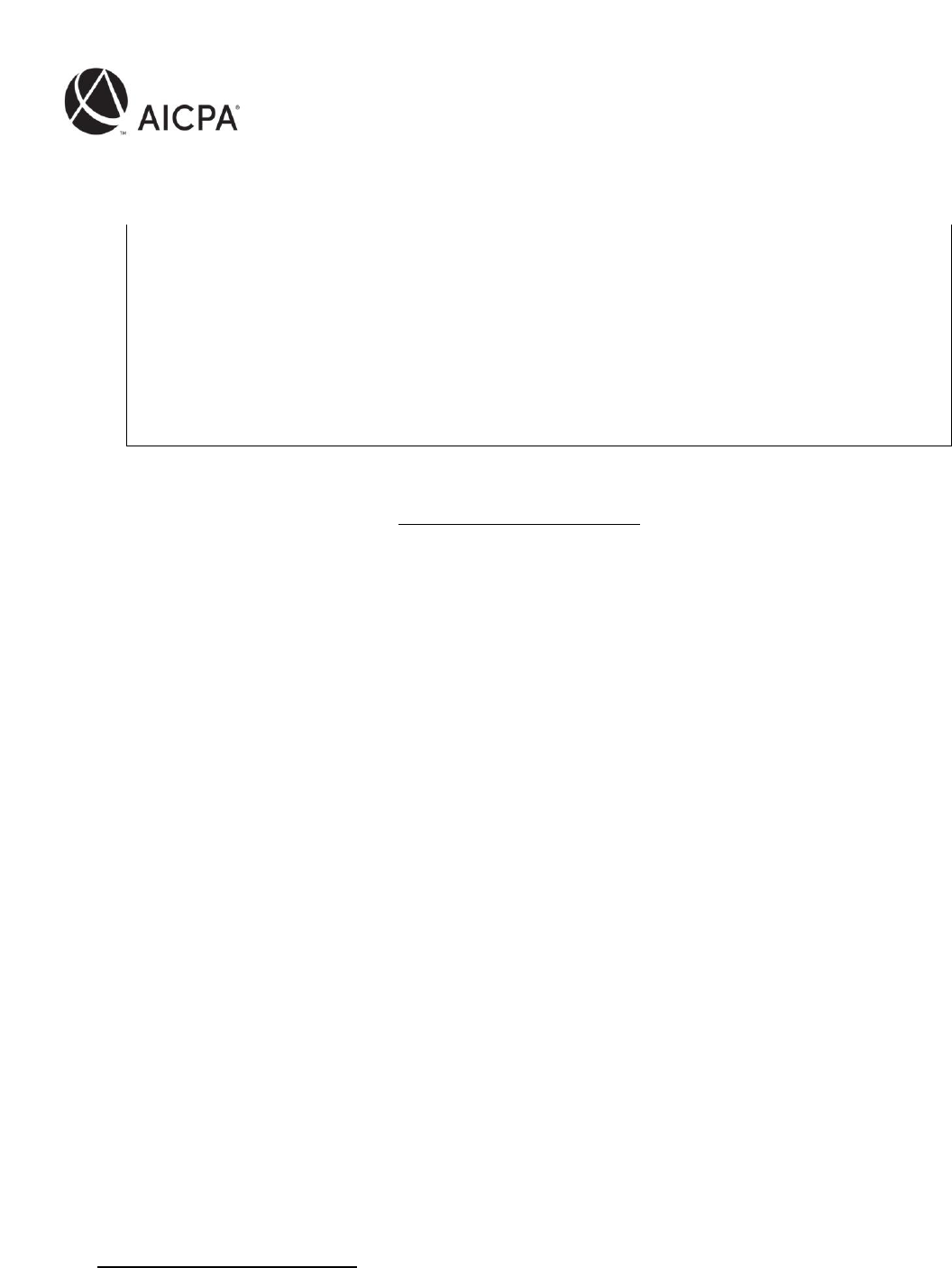
© 2021 AICPA. All rights reserved.
• The report on the 2021 ERISA-required supplemental schedules is presented as an other-matter
paragraph in accordance with paragraph .132 of AU-C section 703. The auditor has concluded
that the form and content of the supplemental schedules, other than the information in the
supplemental schedules that agreed to or is derived from the certified investment information, is
presented, in all material respects, in conformity with the Department of Labor's Rules and
Regulations for Reporting and Disclosure under ERISA. The information in the supplemental
schedules related to assets held by and certified to by a qualified institution agreed to or is
derived from, in all material respects, the information prepared and certified by an institution that
management determined meets the requirements of ERISA Section 103(a)(3)(C).
Independent Auditor’s Report
[Appropriate Addressee]
[Same “Scope and Nature of the ERISA Section 103(a)(3)(C) Audit for the 2021 Financial Statements,”
“Opinion on the 2021 Financial Statements,” “Basis for the Opinion on the 2021 Financial
Statements,” “Responsibilities of Management for the 2021 Financial Statements,” and “Auditor’s
Responsibilities for the Audit of the 2021 Financial Statements,” sections as in illustration 1-1.]
Other Matters
2021 Supplemental Schedules Required by ERISA
11
The supplemental schedules of [identify the title of supplemental schedules and periods covered],
are presented for purposes of additional analysis and are not a required part of the financial
statements but are supplementary information required by the Department of Labor's Rules and
Regulations for Reporting and Disclosure under ERISA. Such information is the responsibility of
management and was derived from and relates directly to the underlying accounting and other
records used to prepare the financial statements. The information included in the supplemental
schedules, other than that agreed to or derived from the certified investment information, has been
subjected to auditing procedures applied in the audit of the financial statements and certain
additional procedures, including comparing and reconciling such information directly to the
underlying accounting and other records used to prepare the financial statements or to the financial
statements themselves, and other additional procedures in accordance with GAAS. For information
included in the supplemental schedules that agreed to or is derived from the certified investment
information, we compared such information to the related certified investment information.
In forming our opinion on the supplemental schedules, we evaluated whether the supplemental
schedules, other than the information agreed to or derived from the certified investment
information, including their form and content, are presented in conformity with the Department of
Labor's Rules and Regulations for Reporting and Disclosure under ERISA.
In our opinion
11
See footnote 8.
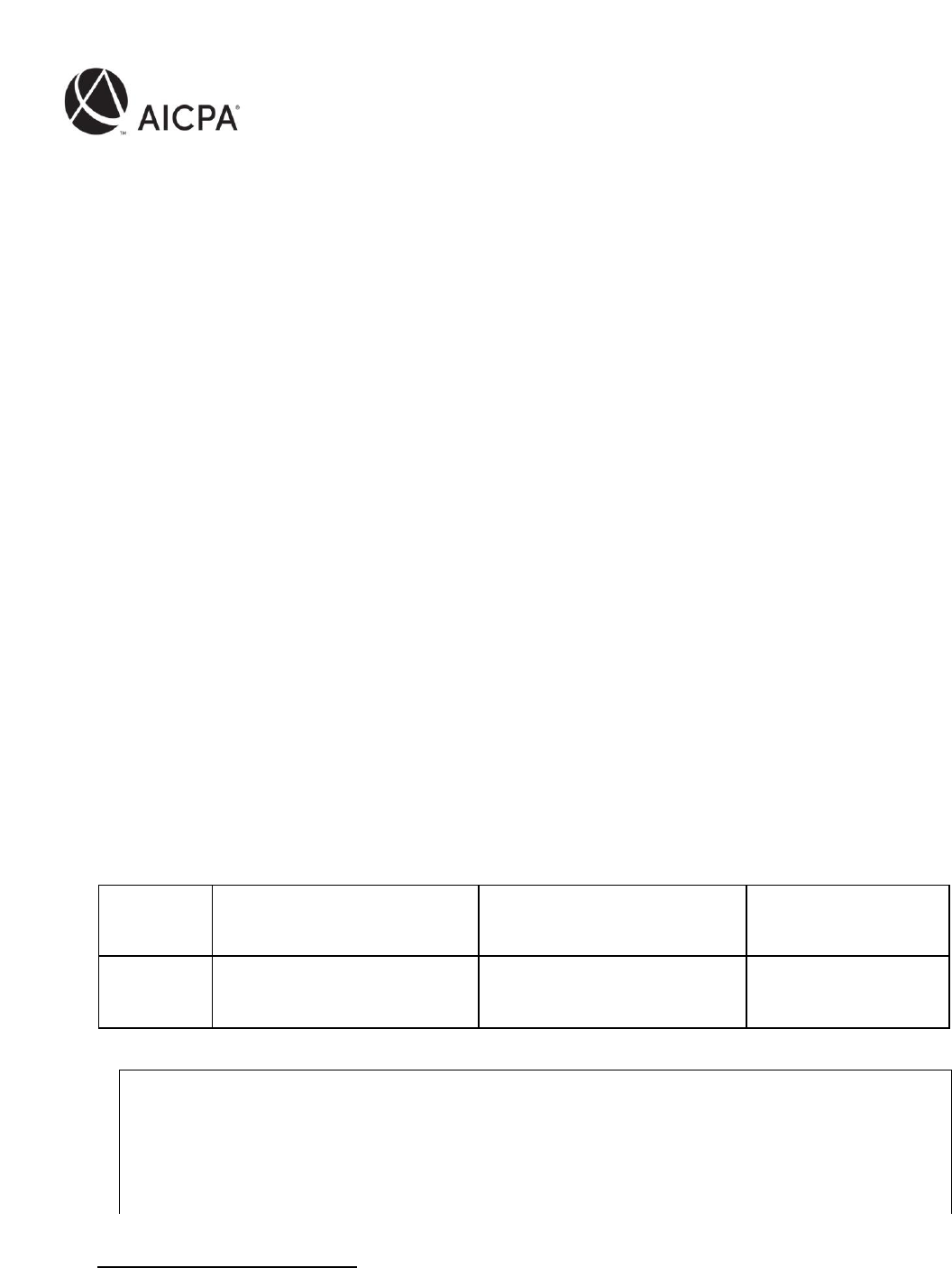
© 2021 AICPA. All rights reserved.
• the form and content of the supplemental schedules, other than the information in the
supplemental schedules that agreed to or is derived from the certified investment
information, are presented, in all material respects, in conformity with the Department of
Labor's Rules and Regulations for Reporting and Disclosure under ERISA.
• the information in the supplemental schedules related to assets held by
12
and certified to by
a qualified institution agrees to, or is derived from, in all material respects, the information
prepared and certified by an institution that management determined meets the
requirements of ERISA Section 103(a)(3)(C).
Auditor’s Report on the 2020 Financial Statements
We have audited the statement of net assets available for benefits of ABC 401(k) Plan as of
December 31, 2020 and the related statement of changes in net assets available for benefits for the
year ended December 31, 2020 (not presented herein), and in our report dated [insert prior year
report date], we expressed an unmodified opinion on those financial statements.
[Signature of the auditor's firm]
[City and state where the auditor's report is issued]
[Date of the auditor's report]
Illustration 1-3
Type of
plan
Current year (2021) – type of
audit
Prior year (2020) – type of
audit
Conditions
401(k)
Non-Section 103(a)(3)(C)
(unmodified opinion)
Limited scope
(disclaimer of opinion)
Continuing auditor
Circumstances include the following:
• The auditor performed a non-Section 103(a)(3)(C) audit as of and for the year ended December
31, 2021 in accordance with GAAS. The auditor has implemented SAS Nos. 134−140 for the
December 31, 2021 plan year.
12
See footnote 5.
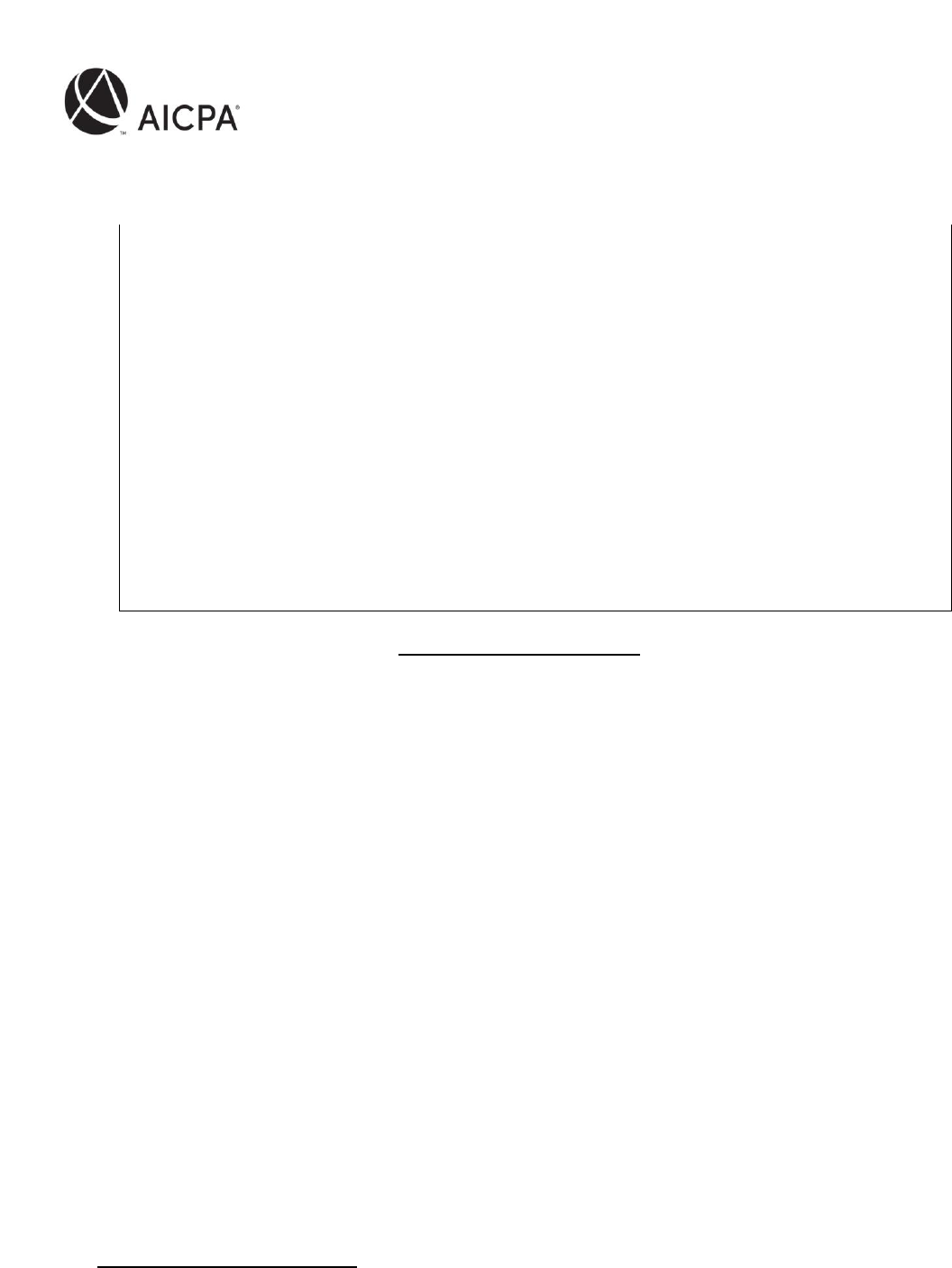
© 2021 AICPA. All rights reserved.
• The auditor has concluded that an unmodified (“clean”) opinion on the ERISA plan financial
statements is appropriate based on the audit evidence obtained.
• The auditor performed a limited-scope audit and disclaimed an opinion on the prior year financial
statements (for the year ended December 31, 2020).
• The auditor is issuing one report by referring to the prior year report in an other-matter
paragraph. In such situations, the auditor typically requests plan management to provide written
representations for both years (see paragraph .A127 of AU-C section 703).
• The report on the 2021 ERISA-required supplemental schedules is presented in a separate section
in accordance with paragraphs .129−.130 of AU-C section 703. The auditor has concluded that the
information in the 2021 ERISA-required supplemental schedules is fairly stated, in all material
respects, in relation to the financial statements as a whole, and the form and content are
presented in conformity with the Department of Labor's Rules and Regulations for Reporting and
Disclosure under ERISA.
Independent Auditor’s Report
[Appropriate Addressee]
Opinion on the 2021 Financial Statements
13
We have audited the financial statements of ABC 401(k) Plan, an employee benefit plan subject to
the Employee Retirement Income Security Act of 1974 (ERISA), which comprise the statement of net
assets available for benefits as of December 31, 2021, and the related statement of changes in net
assets available for benefits for the year then ended, and the related notes to the financial
statements.
In our opinion, the accompanying financial statements present fairly, in all material respects, the net
assets available for benefits of ABC 401(k) Plan as of December 31, 2021, and the changes in its net
assets available for benefits for the year then ended, in accordance with accounting principles
generally accepted in the United States of America.
Basis for Opinion on the 2021 Financial Statements
We conducted our audit in accordance with auditing standards generally accepted in the United
States of America (GAAS). Our responsibilities under those standards are further described in the
Auditor’s Responsibilities for the Audit of the 2021 Financial Statements section of our report. We are
required to be independent of ABC 401(k) Plan and to meet our other ethical responsibilities, in
accordance with the relevant ethical requirements relating to our audits. We believe that the audit
evidence we have obtained is sufficient and appropriate to provide a basis for our audit opinion.
13
See footnote 3.
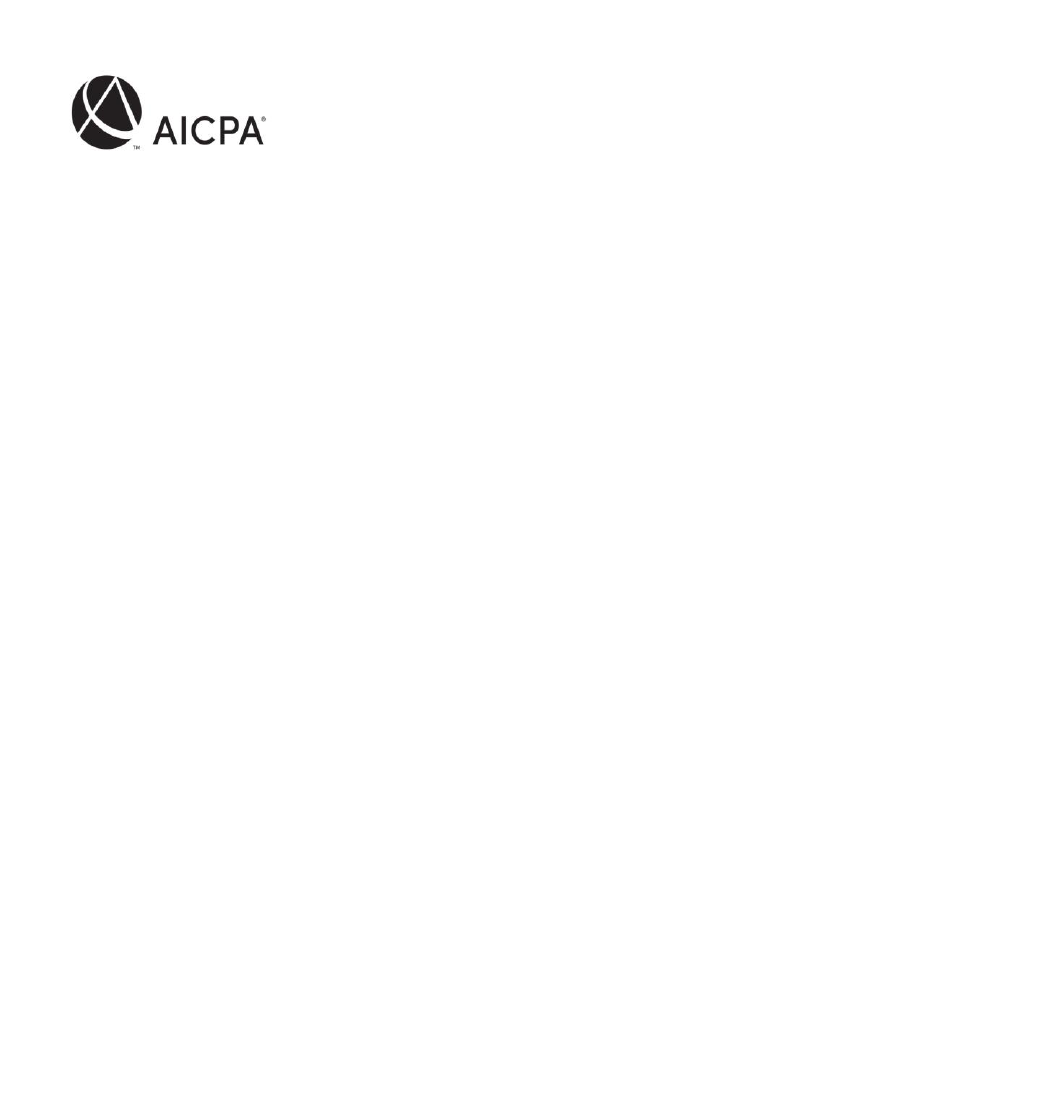
© 2021 AICPA. All rights reserved.
Responsibilities of Management for the 2021 Financial Statements
Management is responsible for the preparation and fair presentation of the financial statements in
accordance with accounting principles generally accepted in the United States of America, and for
the design, implementation, and maintenance of internal control relevant to the preparation and
fair presentation of financial statements that are free from material misstatement, whether due to
fraud or error.
In preparing the financial statements, management is required to evaluate whether there are
conditions or events, considered in the aggregate, that raise substantial doubt about ABC 401(k)
Plan’s ability to continue as a going concern for [insert the time period set by the applicable financial
reporting framework].
Management is also responsible for maintaining a current plan instrument, including all plan
amendments, administering the plan, and determining that the plan’s transactions that are
presented and disclosed in the financial statements are in conformity with the plan’s provisions,
including maintaining sufficient records with respect to each of the participants, to determine the
benefits due or which may become due to such participants.
Auditor’s Responsibilities for the Audit of the 2021 Financial Statements
Our objectives are to obtain reasonable assurance about whether the financial statements as a
whole are free from material misstatement, whether due to fraud or error, and to issue an auditor’s
report that includes our opinion. Reasonable assurance is a high level of assurance but is not
absolute assurance and therefore is not a guarantee that an audit conducted in accordance with
GAAS will always detect a material misstatement when it exists. The risk of not detecting a material
misstatement resulting from fraud is higher than for one resulting from error, as fraud may involve
collusion, forgery, intentional omissions, misrepresentations, or the override of internal control.
Misstatements are considered material if, individually or in the aggregate, they could reasonably be
expected to influence the economic decisions of users made on the basis of these financial
statements.
In performing an audit in accordance with GAAS, we:
• Exercise professional judgment and maintain professional skepticism throughout the audit.
• Identify and assess the risks of material misstatement of the financial statements, whether
due to fraud or error, and design and perform audit procedures responsive to those risks.
Such procedures include examining, on a test basis, evidence regarding the amounts and
disclosures in the financial statements.
• Obtain an understanding of internal control relevant to the audit in order to design audit
procedures that are appropriate in the circumstances, but not for the purpose of expressing

© 2021 AICPA. All rights reserved.
an opinion on the effectiveness of ABC 401(k) Plan’s internal control. Accordingly, no such
opinion is expressed.
• Evaluate the appropriateness of accounting policies used and the reasonableness of
significant accounting estimates made by management, as well as evaluate the overall
presentation of the financial statements.
• Conclude whether, in our judgment, there are conditions or events, considered in the
aggregate, that raise substantial doubt about ABC 401(k) Plan’s ability to continue as a going
concern for a reasonable period of time.
We are required to communicate with those charged with governance regarding, among other
matters, the planned scope and timing of the audit, significant audit findings, and certain internal
control-related matters that we identified during the audit.
2021 Supplemental Schedules Required by ERISA
14
Our audit was conducted for the purpose of forming an opinion on the financial statements as a
whole. The supplemental schedules of [identify title of supplemental schedules and periods covered]
are presented for purposes of additional analysis and are not a required part of the financial
statements but are supplementary information required by the Department of Labor’s Rules and
Regulations for Reporting and Disclosure under ERISA. Such information is the responsibility of
management and was derived from and relates directly to the underlying accounting and other
records used to prepare the financial statements. The information has been subjected to the
auditing procedures applied in the audits of the financial statements and certain additional
procedures, including comparing and reconciling such information directly to the underlying
accounting and other records used to prepare the financial statements or to the financial
statements themselves, and other additional procedures in accordance with GAAS.
In forming our opinion on the supplemental schedules, we evaluated whether the supplemental
schedules, including their form and content, are presented in conformity with the Department of
Labor’s Rules and Regulations for Reporting and Disclosure under ERISA.
In our opinion, the information in the accompanying schedules is fairly stated, in all material
respects, in relation to the financial statements as a whole, and the form and content are presented
in conformity with the Department of Labor’s Rules and Regulations for Reporting and Disclosure
under ERISA.
Other Matter
Auditor’s Report on the 2020 Financial Statements
14
See footnote 8.
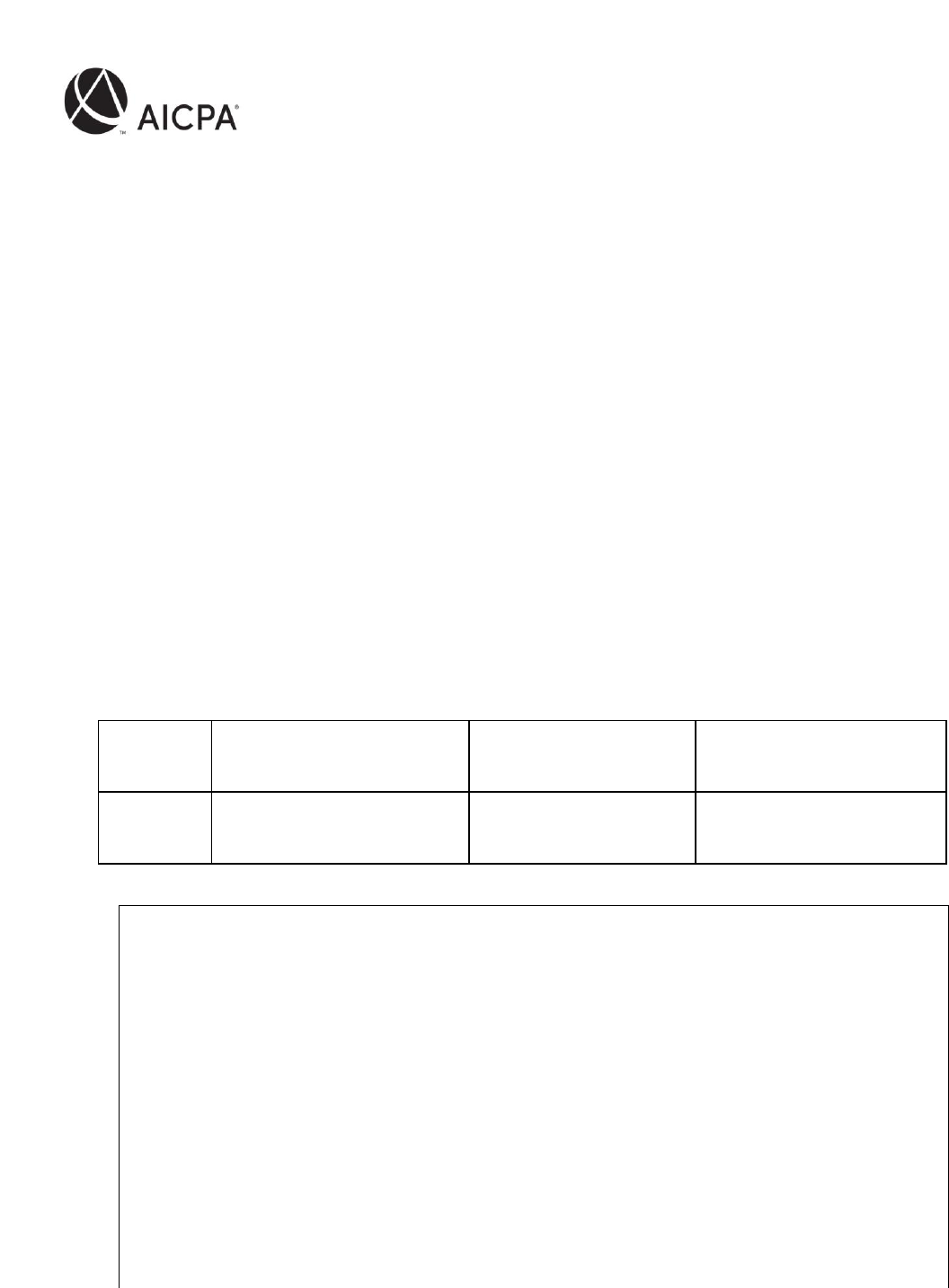
© 2021 AICPA. All rights reserved.
We were engaged to audit the 2020 financial statements of ABC 401(k) Plan. As permitted by 29
CFR 2520.103-8 of the Department of Labor’s Rules and Regulations for Reporting and Disclosure
under ERISA, the plan administrator instructed us not to perform and we did not perform any
auditing procedures with respect to the information certified by a qualified institution. In our report
dated [insert prior year report date], we indicated that (a) because of the significance of the
information that we did not audit, we were not able to obtain sufficient appropriate audit evidence
to provide a basis for an audit opinion and accordingly, we did not express an opinion on the 2020
financial statements, and (b) the form and content of the information included in the 2020 financial
statements other than that derived from the certified information were presented in compliance
with the Department of Labor’s Rules and Regulations for Reporting and Disclosure under ERISA.
[Signature of the auditor’s firm]
[City and state where the auditor’s report is issued]
[Date of the auditor’s report]
Illustration 1-4
Type of
plan
Current year (2021) – type of
audit
Prior year (2020) – type
of audit
Conditions
401(k)
Non-Section 103(a)(3)(C)
(unmodified opinion)
Full scope
(unmodified opinion)
Continuing auditor
Circumstances include the following:
• The auditor performed a non-Section 103(a)(3)(C) audit as of and for the year ended December
31, 2021 in accordance with GAAS. The auditor has implemented SAS Nos. 134−140 for the
December 31, 2021 plan year.
• The auditor has concluded that an unmodified (“clean”) opinion on the ERISA plan financial
statements is appropriate based on the audit evidence obtained.
• The auditor performed a full-scope audit and issued an unmodified (“clean”) opinion on the prior
year financial statements (for the year ended December 31, 2020).
• In accordance with paragraph .86 of AU-C section 703, when the auditor is expressing an opinion
on all periods presented, a continuing auditor should update the report on the financial
statements of one or more prior periods presented on a comparative basis with those of the
current period. When issuing an updated report, the information considered by the continuing
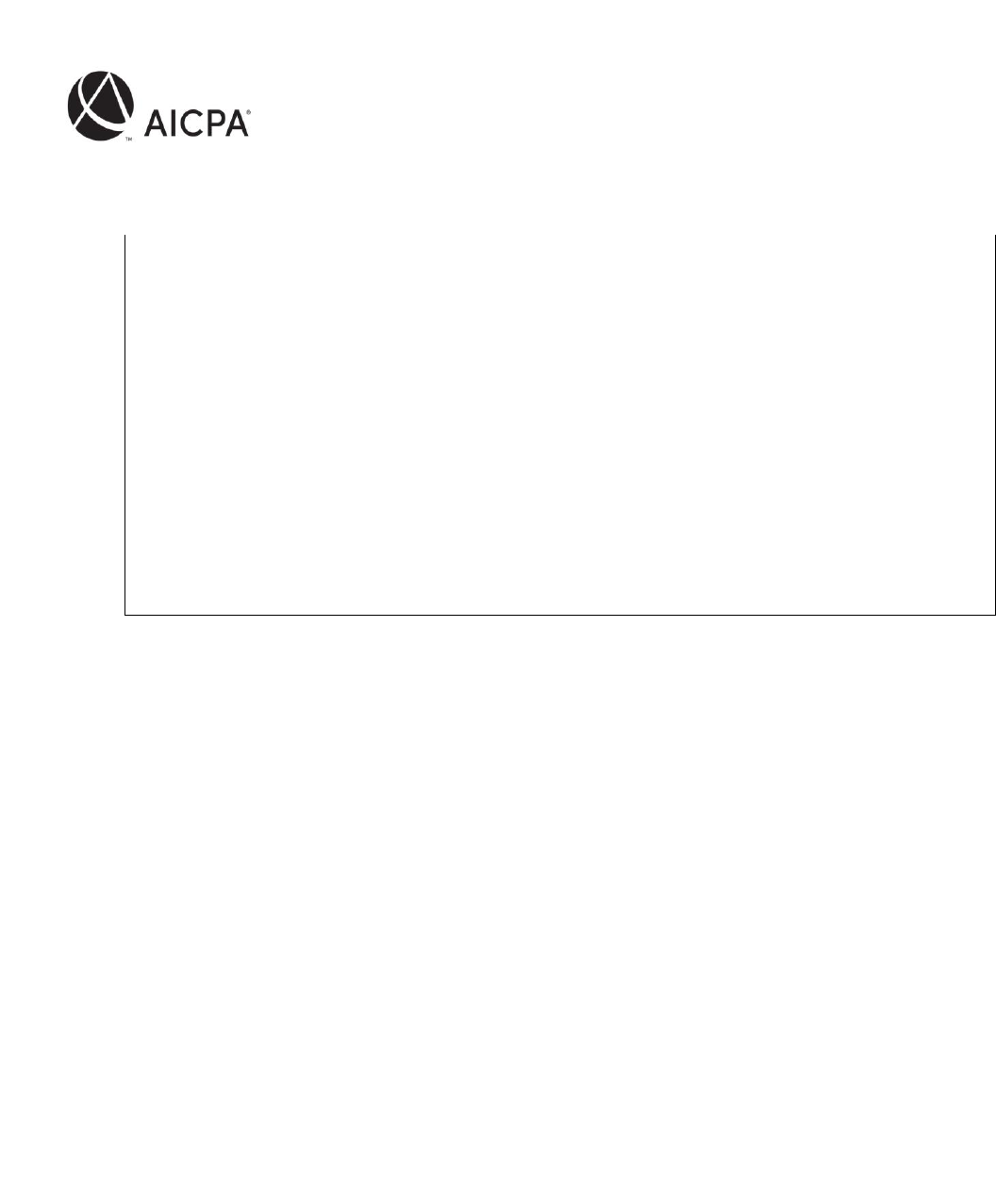
© 2021 AICPA. All rights reserved.
auditor is that which the auditor becomes aware of during the audit of the current period
financial statements. An updated report issued in conjunction with the auditor’s report on the
current period financial statements. In this situation, because the auditor performed a full-scope
audit in the prior year and is performing a non-Section 103(a)(3)(C) audit in the current year, the
auditor would have obtained sufficient appropriate audit evidence in each year in which to
conclude whether the financial statements are fairly presented, in all material respects.
Accordingly, the auditor has concluded that the standard form of report is appropriate provided
the auditor has updated the prior year report as discussed previously.
• The report on the 2021 ERISA-required supplemental schedules is presented in a separate section
in accordance with paragraphs .129−.130 of AU-C section 703. The auditor has concluded that
the information in the 2021 ERISA-required supplemental schedules is fairly stated, in all material
respects, in relation to the financial statements as a whole, and the form and content are
presented in conformity with the Department of Labor's Rules and Regulations for Reporting and
Disclosure under ERISA.
When a continuing auditor performed a full-scope audit of comparative ERISA plan financial statements
in the prior year and a non-Section 103(a)(3)(C) audit in the current year (the initial year of
implementation of the EBP SAS, as amended), the continuing auditor updates their prior year report in
accordance with paragraph .86 of AU-C section 703. This would result in issuing one report that refers to
each period for which the financial statements are presented and on which the auditor is expressing an
opinion (for example, for the year ended December 31, 2021 and 2020). This would not differ from the
form of report when the auditor performs a non-Section 103(a)(3)(C) audit in both years. Illustration 1
from exhibit A of AU-C section 703 (also shown in chapter 11 of AICPA Audit and Accounting Guide
Employee Benefit Plans) contains such an example.
Paragraph .86 of AU-C section 703 states that when expressing an opinion on all periods presented, a
continuing auditor should update the report on the financial statements of one or more prior periods
presented on a comparative basis with those of the current period. The auditor’s report on comparative
financial statements should not be dated earlier than the date on which the auditor has obtained
sufficient appropriate audit evidence on which to support the opinion for the most recent audit.
Paragraph .A125 of AU-C section 703 explains that an updated report on prior period financial
statements is distinguished from a reissuance of a previous report. When issuing an updated report, the
information considered by the continuing auditor is that which the auditor has become aware of during
the audit of the current period financial statements. An updated report is issued in conjunction with the
auditor’s report on the current period financial statements.
Illustration 1-5
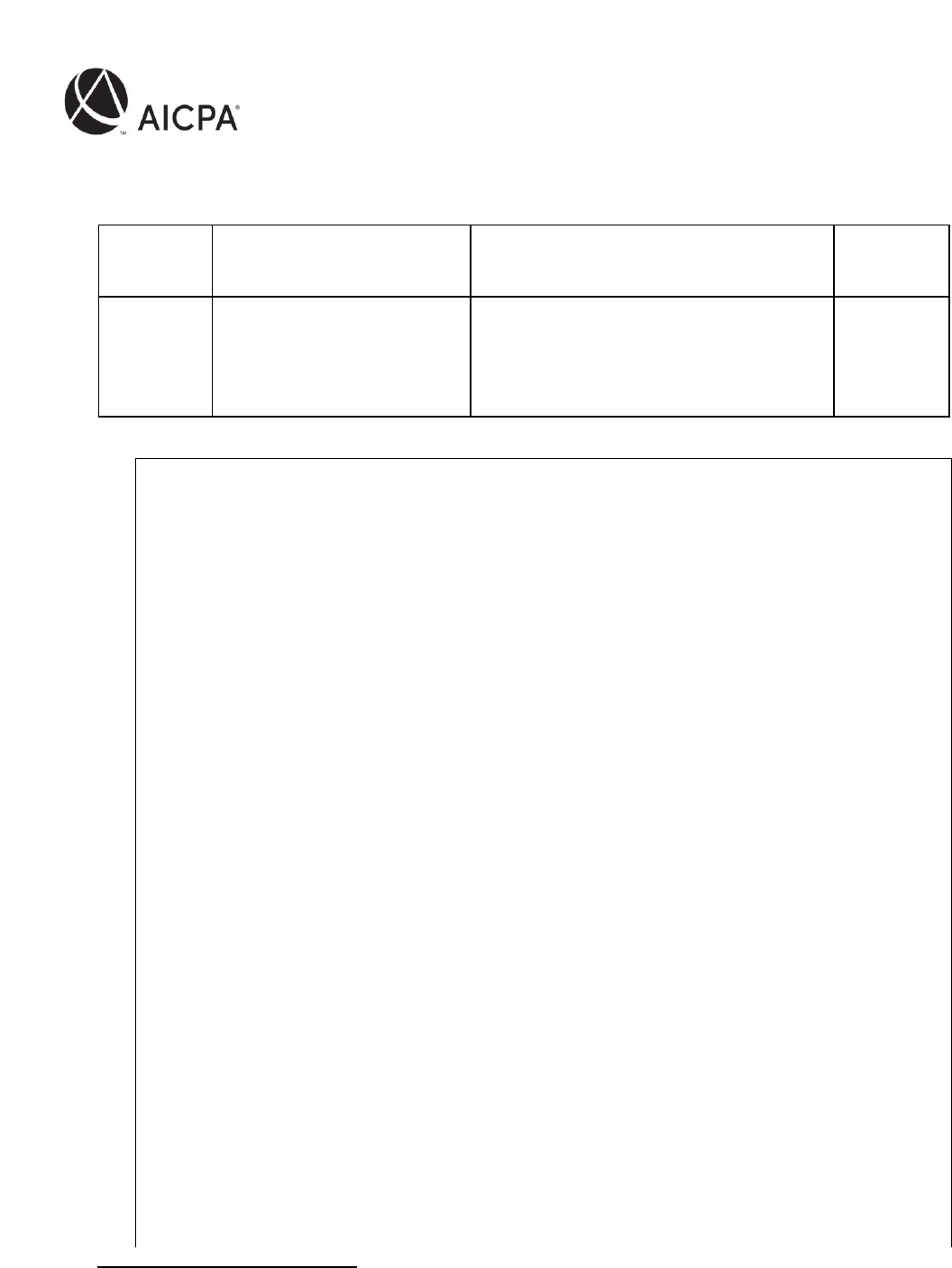
© 2021 AICPA. All rights reserved.
Type of
plan
Current year (2021) – type of
audit
Prior year (2020) – type of audit
Conditions
403(b)
ERISA Section 103(a)(3)(C)
with a limitation on the
scope of the audit
(disclaimer of opinion)
Limited scope with respect to investment
information and additional limitation on
the scope of the audit
(disclaimer of opinion)
Continuing
auditor
Circumstances include the following:
• Management elected an ERISA Section 103(a)(3)(C) audit for the 2021 plan year financial
statements as permitted by the Code of Federal Regulations (CFR), Labor, Title 29, Section
2520.103-8 of the Department of Labor's Rules and Regulations for Reporting and Disclosure
under ERISA.
15
• The auditor performed an ERISA Section 103(a)(3)(C) audit as of and for the year ended
December 31, 2021 in accordance with GAAS. The auditor has implemented SAS Nos. 134−140
for the December 31, 2021 plan year.
• The auditor had concluded to disclaim an opinion on the 2021 financial statements because
the Plan has not maintained sufficient accounting records and supporting documents relating
to certain annuity contracts and custodial accounts issued to current and former employees
prior to January 1, 2009.
• Further, the Plan has excluded from investments in the accompanying statements of net assets
available for benefits certain annuity contracts and custodial accounts issued to current and
former employees prior to January 1, 2009, as permitted by the Department of Labor's Field
Assistance Bulletin No. 2009-02, Annual Reporting Requirements for 403(b) Plans.
• The auditor has concluded that ERISA Section 103(a)(3)(C) report with a disclaimer of opinion is
appropriate as of and for the year ended December 31, 2021 based on the audit evidence
obtained.
• In the prior year, the auditor performed a limited-scope audit and disclaimed an opinion on the
prior year financial statements (for the year ended December 31, 2020) due to lack of sufficient
books and records and excluded contracts.
• The auditor is issuing one report by referring to the prior year report in an other-matter
paragraph. In such situations, the auditor typically requests plan management to provide
written representations for both years (see paragraph .A127 of AU-C section 703).
15
See footnote 2.
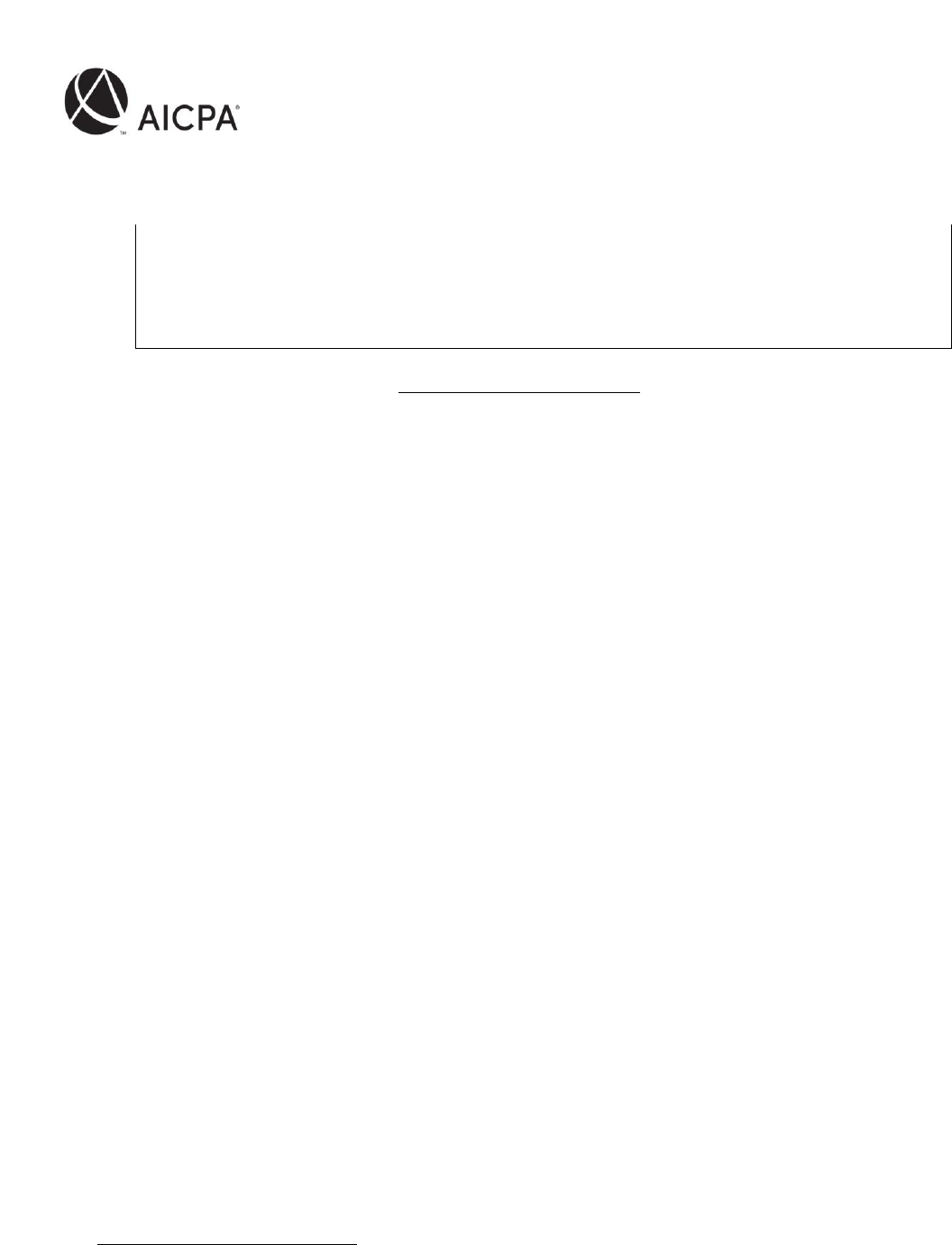
© 2021 AICPA. All rights reserved.
• The report on the 2021 ERISA-required supplemental schedules is presented as an other-matter
paragraph in accordance with paragraph .132 of AU-C section 703. In accordance with
paragraph .132(i) of AU-C section 703, the auditor is precluded from expressing an opinion on
the supplemental schedules when the auditor’s report on the ERISA plan financial statements
contains a disclaimer of opinion.
Independent Auditor's Report
[Appropriate Addressee]
Scope and Nature of the ERISA Section 103(a)(3)(C) Audit for the 2021 Financial Statements
16
We were engaged to perform an audit of the financial statements of XYZ 403(b) Plan, an employee
benefit plan subject to the Employee Retirement Income Security Act of 1974 (ERISA), as permitted
by ERISA Section 103(a)(3)(C) (ERISA Section 103(a)(3)(C) audit). The financial statements comprise
the statement of net assets available for benefits as of December 31, 2021, and the related
statement of changes in net assets available for benefits for the year ended December 31, 2021, and
the related notes to the financial statements.
Management, having determined it is permissible in the circumstances, has elected to have the
audit of XYZ 403(b) Plan's 2021 financial statements performed in accordance with ERISA Section
103(a)(3)(C) pursuant to 29 CFR 2520.103-8 of the Department of Labor's Rules and Regulations for
Reporting and Disclosure under ERISA. As permitted by ERISA Section 103(a)(3)(C), our audit need
not extend to any statements or information related to assets held for investment of the plan
(investment information) by a bank or similar institution or insurance carrier that is regulated,
supervised, and subject to periodic examination by a state or federal agency, provided that the
statements or information regarding assets so held are prepared and certified to by the bank or
similar institution or insurance carrier in accordance with 29 CFR 2520.103-5 of the Department of
Labor's Rules and Regulations for Reporting and Disclosure under ERISA (qualified institution).
Management has obtained a certification from a qualified institution as of and for the year ended
December 31, 2021 stating that the certified investment information, as described in Note X to the
financial statements, is complete and accurate.
17
Disclaimer of Opinion on the 2021 Financial Statements
We do not express an opinion on the accompanying 2021 financial statements of XYZ 403(b) Plan.
Because of the significance of the matters described in the Basis for Disclaimer of Opinion for the
2021 Financial Statements section of our report, we have not been able to obtain sufficient
appropriate audit evidence to provide a basis for an audit opinion on the financial statements.
16
See footnote 3.
17
See footnote 5.
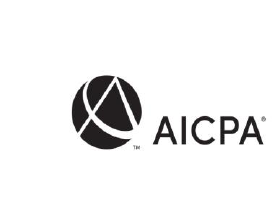
© 2021 AICPA. All rights reserved.
Basis for Disclaimer of Opinion on the 2021 Financial Statements
XYZ 403(b) Plan has not maintained sufficient accounting records and supporting documents relating
to certain annuity contracts and custodial accounts issued to current and former employees prior to
January 1, 2009. Accordingly, we were unable to apply auditing procedures sufficient to determine
the extent to which the accompanying financial statements may have been affected by these
conditions.
Further, as described in Note Y to the financial statements, the XYZ 403(b) Plan has excluded from
investments in the accompanying statement of net assets available for benefits certain annuity
contracts and custodial accounts issued to current and former employees prior to January 1, 2009,
as permitted by the Department of Labor's Field Assistance Bulletin No. 2009-02, Annual Reporting
Requirements for 403(b) Plans. The investment income and distributions related to such accounts
have also been excluded in the accompanying statement of changes in net assets available for
benefits. The amount of these excluded annuity contracts and custodial accounts and the related
income and distributions are not reasonably determinable. Accounting principles generally accepted
in the United States of America require that these accounts and the related income and
distributions be included in the accompanying financial statements.
Responsibilities of Management for the 2021 Financial Statements
Management is responsible for the preparation and fair presentation of the financial statements in
accordance with accounting principles generally accepted in the United States of America, and for
the design, implementation, and maintenance of internal control relevant to the preparation and
fair presentation of financial statements that are free from material misstatement, whether due to
fraud or error. Management's election of the ERISA Section 103(a)(3)(C) audit does not affect
management's responsibility for the financial statements.
In preparing the financial statements, management is required to evaluate whether there are
conditions or events, considered in the aggregate, that raise substantial doubt about XYZ 403(b)
Plan's ability to continue as a going concern for [insert the time period set by the applicable financial
reporting framework].
Management is also responsible for maintaining a current plan instrument, including all plan
amendments, administering the plan, and determining that the plan's transactions that are
presented and disclosed in the financial statements are in conformity with the plan's provisions,
including maintaining sufficient records with respect to each of the participants, to determine the
benefits due or which may become due to such participants.
Auditor’s Responsibilities for the Audit of the 2021 Financial Statements
Our responsibility is to conduct an audit of XYZ 403(b) Plan's financial statements in accordance with
auditing standards generally accepted in the United States of America and to issue an auditor's
report. However, because of the matters described in the Basis for Disclaimer of Opinion on the
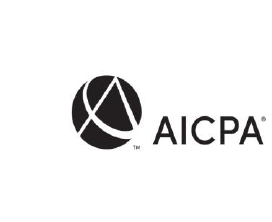
© 2021 AICPA. All rights reserved.
2021 Financial Statements section of our report, we were not able to obtain sufficient appropriate
audit evidence to provide a basis for an audit opinion on these financial statements.
We are required to be independent of XYZ 403(b) Plan, and to meet our other ethical
responsibilities, in accordance with the relevant ethical requirements relating to our audit.
Other Matters
2021 Supplemental Schedules Required by ERISA
The supplemental schedules of [identify the title of supplemental schedules and periods covered] are
presented for purposes of additional analysis and are not a required part of the financial statements
but are supplementary information required by the Department of Labor's Rules and Regulations for
Reporting and Disclosure under ERISA. Such information is the responsibility of management and
was derived from and relates directly to the underlying accounting and other records used to
prepare the financial statements. Because of the significance of the matters described in the Basis
for Disclaimer of Opinion for the 2021 Financial Statements section of our report, it is inappropriate
to and we do not express an opinion on these supplemental schedules.
Auditor’s Report on the 2020 Financial Statements
We were engaged to audit the 2020 financial statements of XYZ 403(b) Plan. As permitted by 29 CFR
2520.103-8 of the Department of Labor's Rules and Regulations for Reporting and Disclosure under
ERISA, the plan administrator instructed us not to perform, and we did not perform, any auditing
procedures with respect to the information certified by a qualified institution. Further, XYZ 403(b)
Plan has not maintained sufficient accounting records and supporting documents relating to certain
annuity contracts and custodial accounts issued to current and former employees prior to January 1,
2009. Accordingly, we were unable to apply auditing procedures sufficient to determine the extent
to which the accompanying financial statements may have been affected by these conditions.
XYZ 403(b) Plan has excluded from the 2020 financial statements certain annuity contracts and
custodial accounts issued to current and former employees prior to January 1, 2009, as permitted by
the Department of Labor's Field Assistance Bulletin No. 2009-02, Annual Reporting Requirements for
403(b) Plans. The investment income and distributions related to such accounts have also been
excluded from the 2020 financial statements. The amount of these excluded annuity contracts and
custodial accounts and the related income and distributions are not determinable. Accounting
principles generally accepted in the United States of America require that these accounts and the
related income and distributions be included in the 2020 financial statements.
In our report dated [insert date of prior year auditor’s report], we indicated that because of the
significance of the information that we did not audit, we were not able to obtain sufficient
appropriate audit evidence to provide a basis for an audit opinion and accordingly, we did not
express an opinion on the 2020 financial statements.

© 2021 AICPA. All rights reserved.
[Signature of the auditor's firm]
[City and state where the auditor's report is issued]
[Date of the auditor's report]
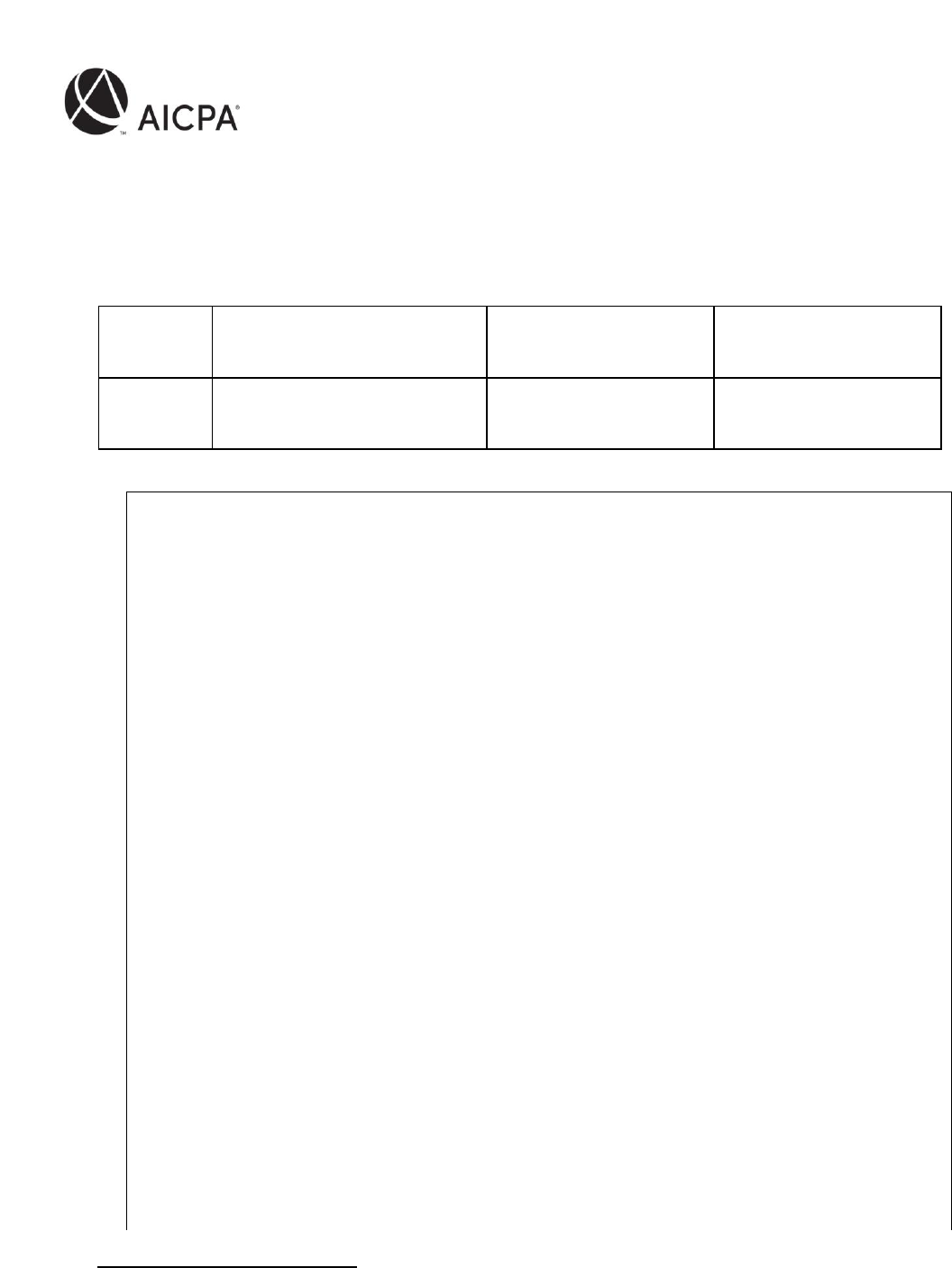
© 2021 AICPA. All rights reserved.
Predecessor Auditor Situations
Illustration 1-6
Type of
plan
Current year (2021) – type of
audit
Prior year (2020) – type
of audit
Conditions
401(k)
ERISA Section 103(a)(3)(C)
Limited scope
(disclaimer of opinion)
Prior period audited by
predecessor auditor
Circumstances include the following:
• Management elected an ERISA Section 103(a)(3)(C) audit for the 2021 plan year financial
statements as permitted by Code of Federal Regulations (CFR), Labor, Title 29, Section 2520.103-8
of the Department of Labor's Rules and Regulations for Reporting and Disclosure under ERISA.
18
• The auditor performed an ERISA Section 103(a)(3)(C) audit as of and for the year ended December
31, 2021 in accordance with GAAS. The auditor has implemented SAS Nos. 134−140 for the
December 31, 2021 plan year.
• The auditor has concluded that the ERISA Section 103(a)(3)(C) report is appropriate as of and for
the year ended December 31, 2021 based on the audit evidence obtained.
• Predecessor auditors performed a limited-scope audit and disclaimed an opinion on the prior year
financial statements (for the year ended December 31, 2020).
• Paragraph .93 of AU-C section 703 addresses how to report when the prior period financial
statements are audited by a predecessor auditor, as follows:
.93 If the financial statements of the prior period were audited by a predecessor auditor, and the
predecessor auditor’s report on the prior period’s financial statements is not reissued, in addition to
expressing an opinion on the current period’s financial statements, the auditor should state the
following in an other-matter paragraph:
(a) That the financial statements of the prior period were audited by a predecessor auditor
(b) The type of opinion expressed by the predecessor auditor and, if the opinion was modified, the
reasons therefore
(c) The nature of an emphasis-of-matter paragraph or other-matter paragraph included in the
predecessor auditor’s report, if any
(d) The date of that report
• The report on the 2021 ERISA-required supplemental schedules is presented as an other-matter
paragraph in accordance with paragraph .132 of AU-C section 703. The auditor has concluded
18
See footnote 2.
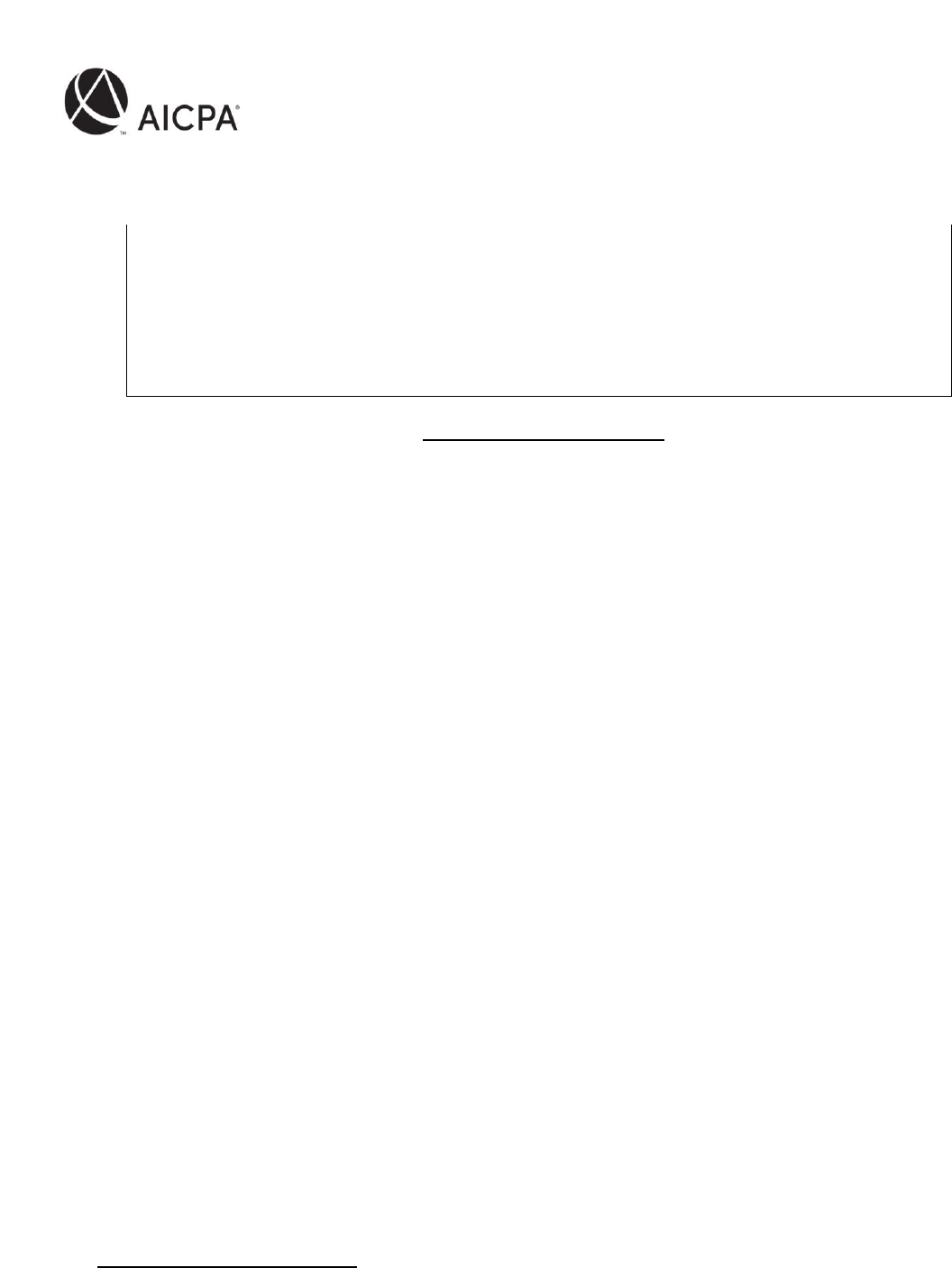
© 2021 AICPA. All rights reserved.
that the form and content of the supplemental schedules, other than the information in the
supplemental schedules that agreed to or is derived from the certified investment information, is
presented, in all material respects, in conformity with the Department of Labor's Rules and
Regulations for Reporting and Disclosure under ERISA. The information in the supplemental
schedules related to assets held by and certified to by a qualified institution agreed to or is
derived from, in all material respects, the information prepared and certified by an institution that
management determined meets the requirements of ERISA Section 103(a)(3)(C).
Independent Auditor’s Report
[Appropriate Addressee]
[Same “Scope and Nature of the ERISA Section 103(a)(3)(C) Audit for the 2021 Financial Statements,”
“Opinion on the 2021 Financial Statements,” “Basis for the Opinion on the 2021 Financial
Statements,” “Responsibilities of Management for the 2021 Financial Statements,” and “Auditor’s
Responsibilities for the Audit of the 2021 Financial Statements,” sections as in illustration 1-1.]
Other Matters
19
2021 Supplemental Schedules Required by ERISA
The supplemental schedules of [identify the title of supplemental schedules and periods covered],
are presented for purposes of additional analysis and are not a required part of the financial
statements but are supplementary information required by the Department of Labor's Rules and
Regulations for Reporting and Disclosure under ERISA. Such information is the responsibility of
management and was derived from and relates directly to the underlying accounting and other
records used to prepare the financial statements. The information included in the supplemental
schedules, other than that agreed to or derived from the certified investment information, has been
subjected to auditing procedures applied in the audit of the financial statements and certain
additional procedures, including comparing and reconciling such information directly to the
underlying accounting and other records used to prepare the financial statements or to the financial
statements themselves, and other additional procedures in accordance with GAAS. For information
included in the supplemental schedules that agreed to or is derived from the certified investment
information, we compared such information to the related certified investment information.
In forming our opinion on the supplemental schedules, we evaluated whether the supplemental
schedules, other than the information agreed to or derived from the certified investment
information, including their form and content, are presented in conformity with the Department of
Labor's Rules and Regulations for Reporting and Disclosure under ERISA.
In our opinion
• the form and content of the supplemental schedules, other than the information in the
supplemental schedules that agreed to or is derived from the certified investment
19
See footnote 8.
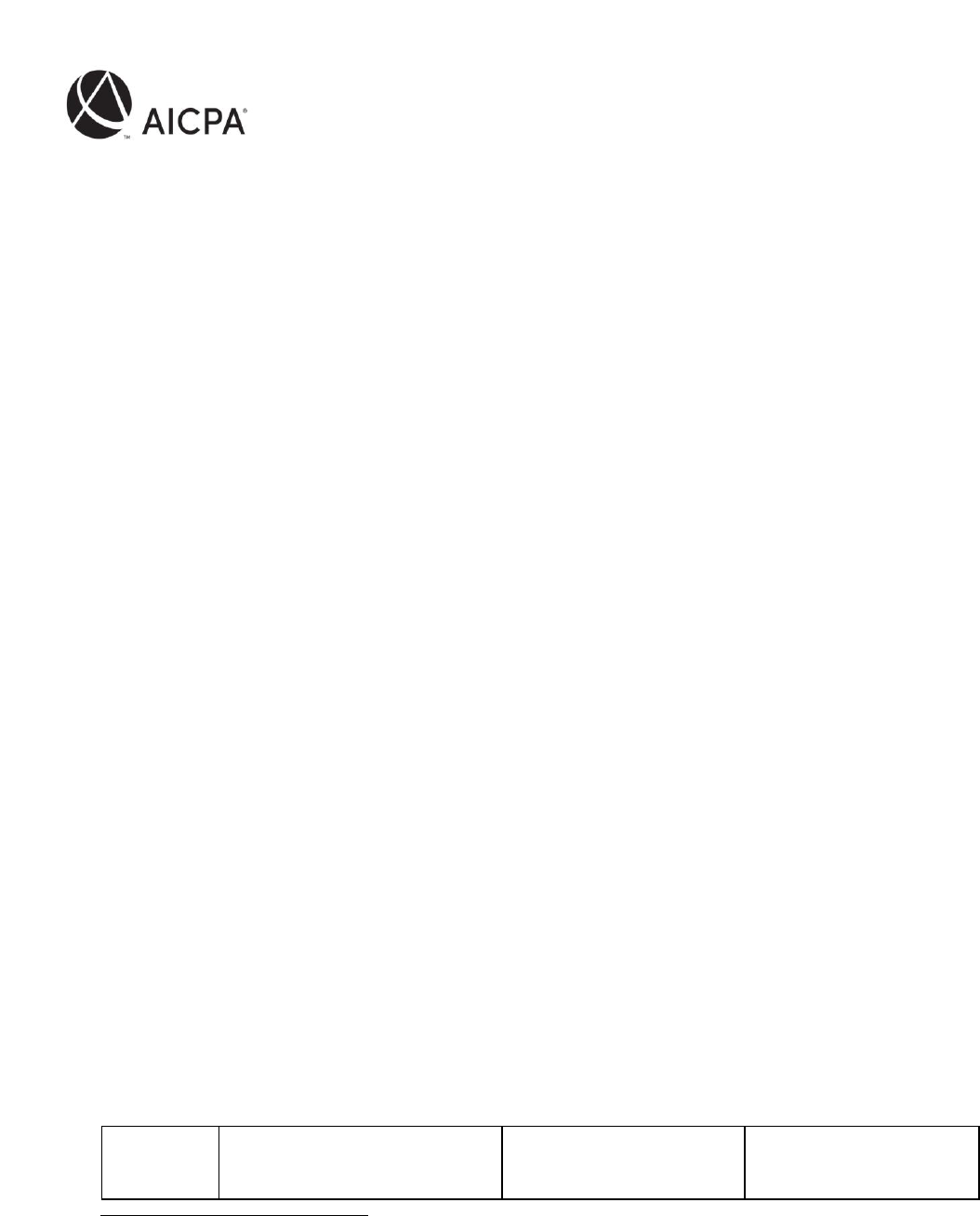
© 2021 AICPA. All rights reserved.
information, are presented, in all material respects, in conformity with the Department of
Labor's Rules and Regulations for Reporting and Disclosure under ERISA.
• the information in the supplemental schedules related to assets held by
20
and certified to by
a qualified institution agrees to, or is derived from, in all material respects, the information
prepared and certified by an institution that management determined meets the
requirements of ERISA Section 103(a)(3)(C).
Auditor’s Report on the 2020 Financial Statements
The 2020 financial statements of ABC 401(k) Plan were audited by predecessor auditors. As
permitted by 29 CFR 2520.103-8 of the Department of Labor's Rules and Regulations for Reporting
and Disclosure under ERISA, the plan administrator instructed the predecessor auditor not to
perform, and they did not perform, any auditing procedures with respect to the information
certified by a qualified institution. Their report dated [insert date of predecessor auditor’s report],
indicated that (a) because of the significance of the information that they did not audit, they were
not able to obtain sufficient appropriate audit evidence to provide a basis for an audit opinion and
accordingly, they did not express an opinion on the financial statements and supplemental
schedules, and (b) the form and content of the information included in the financial statements and
supplemental schedules other than that derived from the certified information, were presented in
compliance with the Department of Labor’s Rules and Regulations for Reporting and Disclosure
under ERISA.
21
[Signature of the auditor's firm]
[City and state where the auditor's report is issued]
[Date of the auditor's report]
Illustration 1-7
Type of
plan
Current year (2021) – type of
audit
Prior year (2020) – type of
audit
Conditions
20
See footnote 5.
21
Paragraph .93 of AU-C section 703 addresses how to report when the prior period financial statements are
audited by a predecessor auditor. Among other things, the auditor should state the nature of an emphasis-of-
matter paragraph, other-matter paragraph or going concern section included in the predecessor auditor’s report, if
any.
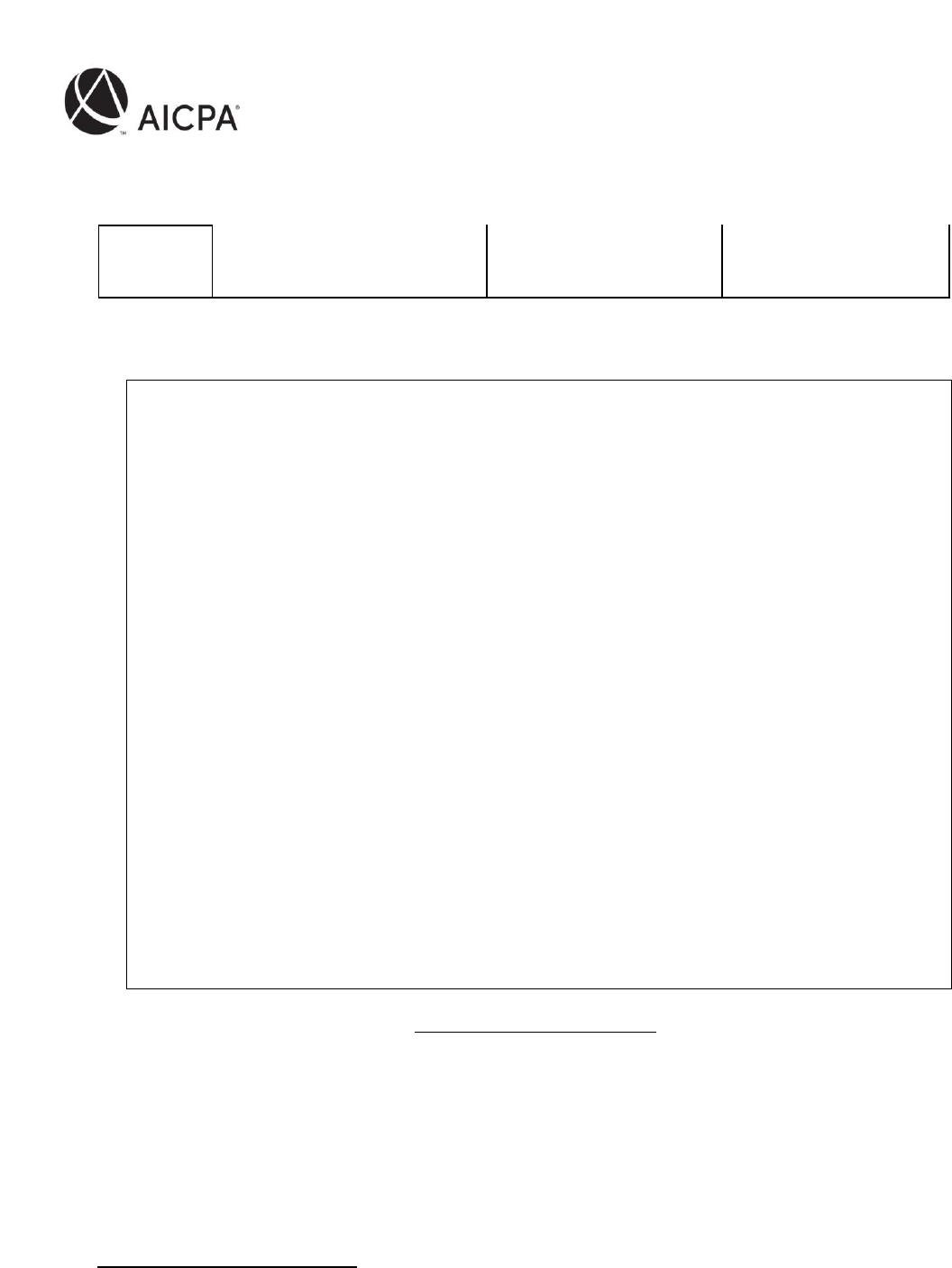
© 2021 AICPA. All rights reserved.
401(k)
ERISA Section 103(a)(3)(C)
Full scope
(unmodified opinion)
Prior period audited by
predecessor auditor
Circumstances include the following:
• Management elected an ERISA Section 103(a)(3)(C) audit for the 2021 plan year financial
statements as permitted by Code of Federal Regulations (CFR), Labor, Title 29, Section 2520.103-8
of the Department of Labor's Rules and Regulations for Reporting and Disclosure under ERISA.
22
• The auditor performed an ERISA Section 103(a)(3)(C) audit as of and for the year ended December
31, 2021 in accordance with GAAS. The auditor has implemented SAS Nos. 134−140 for the
December 31, 2021 plan year.
• The auditor has concluded that the ERISA Section 103(a)(3)(C) report is appropriate as of and for
the year ended December 31, 2021 based on the audit evidence obtained.
• Predecessor auditors performed a full-scope audit in the prior year and issued an unmodified
“clean” opinion on the prior year financial statements (for the year ended December 31, 2020).
• Paragraph .93 of AU-C section 703 addresses how to report when the prior period financial
statements are audited by a predecessor auditor.
• The report on the 2021 ERISA-required supplemental schedules is presented as an other-matter
paragraph in accordance with paragraph .132 of AU-C section 703. The auditor has concluded
that the form and content of the supplemental schedules, other than the information in the
supplemental schedules that agreed to or is derived from the certified investment information, is
presented, in all material respects, in conformity with the Department of Labor's Rules and
Regulations for Reporting and Disclosure under ERISA. The information in the supplemental
schedules related to assets held by and certified to by a qualified institution agreed to or is
derived from, in all material respects, the information prepared and certified by an institution that
management determined meets the requirements of ERISA Section 103(a)(3)(C).
Independent Auditor’s Report
[Appropriate Addressee]
[Same “Scope and Nature of the ERISA Section 103(a)(3)(C) Audit for the 2021 Financial Statements,”
“Opinion on the 2021 Financial Statements,” “Basis for the Opinion on the 2021 Financial
Statements,” “Responsibilities of Management for the 2021 Financial Statements,” and “Auditor’s
Responsibilities for the Audit of the 2021 Financial Statements,” sections as in illustration 1-1.]
Other Matters
22
See footnote 2.

© 2021 AICPA. All rights reserved.
2021 Supplemental Schedules Required by ERISA
The supplemental schedules of [identify the title of supplemental schedules and periods covered],
are presented for purposes of additional analysis and are not a required part of the financial
statements but are supplementary information required by the Department of Labor's Rules and
Regulations for Reporting and Disclosure under ERISA. Such information is the responsibility of
management and was derived from and relates directly to the underlying accounting and other
records used to prepare the financial statements. The information included in the supplemental
schedules, other than that agreed to or derived from the certified investment information, has been
subjected to auditing procedures applied in the audit of the financial statements and certain
additional procedures, including comparing and reconciling such information directly to the
underlying accounting and other records used to prepare the financial statements or to the
financial statements themselves, and other additional procedures in accordance with GAAS. For
information included in the supplemental schedules that agreed to or is derived from the certified
investment information, we compared such information to the related certified investment
information.
In forming our opinion on the supplemental schedules, we evaluated whether the supplemental
schedules, other than the information agreed to or derived from the certified investment
information, including their form and content, are presented in conformity with the Department of
Labor's Rules and Regulations for Reporting and Disclosure under ERISA.
In our opinion
• the form and content of the supplemental schedules, other than the information in the
supplemental schedules that agreed to or is derived from the certified investment
information, are presented, in all material respects, in conformity with the Department of
Labor's Rules and Regulations for Reporting and Disclosure under ERISA.
• the information in the supplemental schedules related to assets held by
23
and certified to by
a qualified institution agrees to, or is derived from, in all material respects, the information
prepared and certified by an institution that management determined meets the
requirements of ERISA Section 103(a)(3)(C).
Auditor’s Report on the 2020 Financial Statements
The 2020 financial statements of ABC 401(k) Plan were audited by predecessor auditors whose
report dated [insert date of predecessor auditor’s report], expressed an unmodified opinion on those
financial statements and included an other-matter paragraph that provided an opinion that the
information in the 2020 supplemental schedules were fairly stated in all material respects in relation
to the financial statements as a whole.
24
23
See footnote 5.
24
See footnote 21.
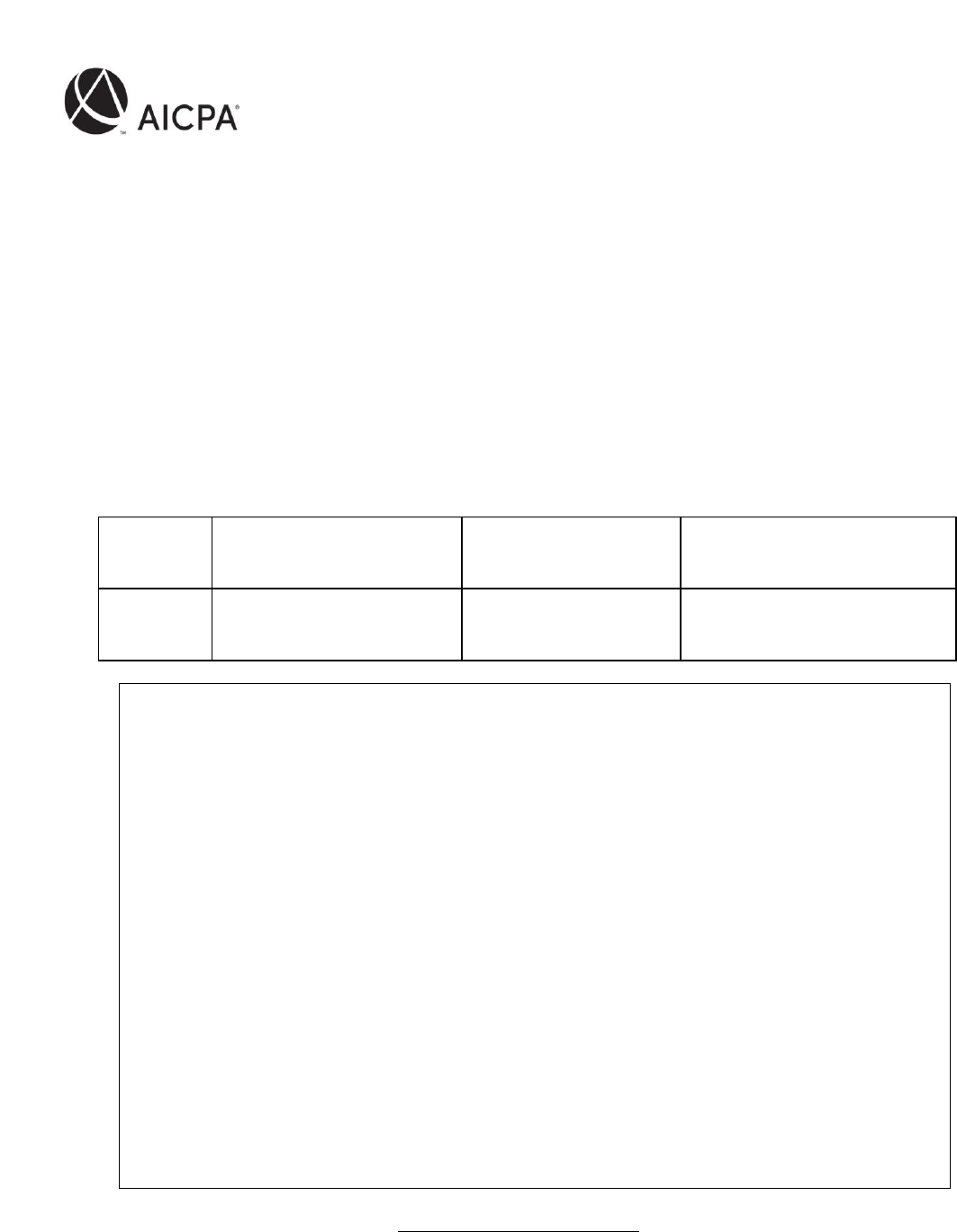
© 2021 AICPA. All rights reserved.
[Signature of the auditor's firm]
[City and state where the auditor's report is issued]
[Date of the auditor's report]
Illustration 1-8
Type of
plan
Current year (2021) – type
of audit
Prior year (2020) – type
of audit
Conditions
401(k)
Non-Section 103(a)(3)(C)
(unmodified opinion)
Limited scope
(disclaimer of opinion)
Prior period audited by
predecessor auditor
Circumstances include the following:
• The auditor performed a non-Section 103(a)(3)(C) audit as of and for the year ended December
31, 2021 in accordance with GAAS. The auditor has implemented SAS Nos. 134−140 for the
December 31, 2021 plan year.
• The auditor has concluded that an unmodified (“clean”) opinion on the ERISA plan financial
statements is appropriate based on the audit evidence obtained.
• Predecessor auditors performed a limited-scope audit and disclaimed an opinion on the prior year
financial statements (for the year ended December 31, 2020).
• Paragraph .93 of AU-C section 703 addresses how to report when the prior period financial
statements are audited by a predecessor auditor.
• The report on the 2021 ERISA-required supplemental schedules is presented in a separate section
in accordance with paragraphs .129−.130 of AU-C section 703. The auditor has concluded that the
information in the 2021 ERISA-required supplemental schedules is fairly stated, in all material
respects, in relation to the financial statements as a whole, and the form and content are
presented in conformity with the Department of Labor's Rules and Regulations for Reporting and
Disclosure under ERISA.
Independent Auditor’s Report
[Appropriate Addressee]

© 2021 AICPA. All rights reserved.
[Same “Opinion on the 2021 Financial Statements,” “Basis for the Opinion on the 2021 Financial
Statements,” “Responsibilities of Management for the 2021 Financial Statements,” and “Auditor’s
Responsibilities for the Audit of the 2021 Financial Statements,” sections as in illustration 1-3.]
2021 Supplemental Schedules Required by ERISA
25
Our audit was conducted for the purpose of forming an opinion on the financial statements as a
whole. The supplemental schedules of [identify title of supplemental schedules and periods covered]
are presented for purposes of additional analysis and are not a required part of the financial
statements but are supplementary information required by the Department of Labor’s Rules and
Regulations for Reporting and Disclosure under ERISA. Such information is the responsibility of
management and was derived from and relates directly to the underlying accounting and other
records used to prepare the financial statements. The information has been subjected to the
auditing procedures applied in the audits of the financial statements and certain additional
procedures, including comparing and reconciling such information directly to the underlying
accounting and other records used to prepare the financial statements or to the financial
statements themselves, and other additional procedures in accordance with GAAS.
In forming our opinion on the supplemental schedules, we evaluated whether the supplemental
schedules, including their form and content, are presented in conformity with the Department of
Labor’s Rules and Regulations for Reporting and Disclosure under ERISA.
In our opinion, the information in the accompanying schedules is fairly stated, in all material
respects, in relation to the financial statements as a whole, and the form and content are presented
in conformity with the Department of Labor’s Rules and Regulations for Reporting and Disclosure
under ERISA.
Other Matter
Auditor’s Report on the 2020 Financial Statements
The 2020 financial statements of ABC 401(k) Plan were audited by predecessor auditors. As
permitted by 29 CFR 2520.103-8 of the Department of Labor's Rules and Regulations for Reporting
and Disclosure under ERISA, the plan administrator instructed the predecessor auditor not to
perform, and they did not perform, any auditing procedures with respect to the information
certified by a qualified institution. Their report dated [insert date of predecessor auditor’s report],
indicated that (a) because of the significance of the information that they did not audit, they were
not able to obtain sufficient appropriate audit evidence to provide a basis for an audit opinion and
accordingly, they did not express an opinion on the financial statements and supplemental
schedules, and (b) the form and content of the information included in the financial statements and
supplemental schedules, other than that derived from the information certified by the trustee, were
25
See footnote 8.
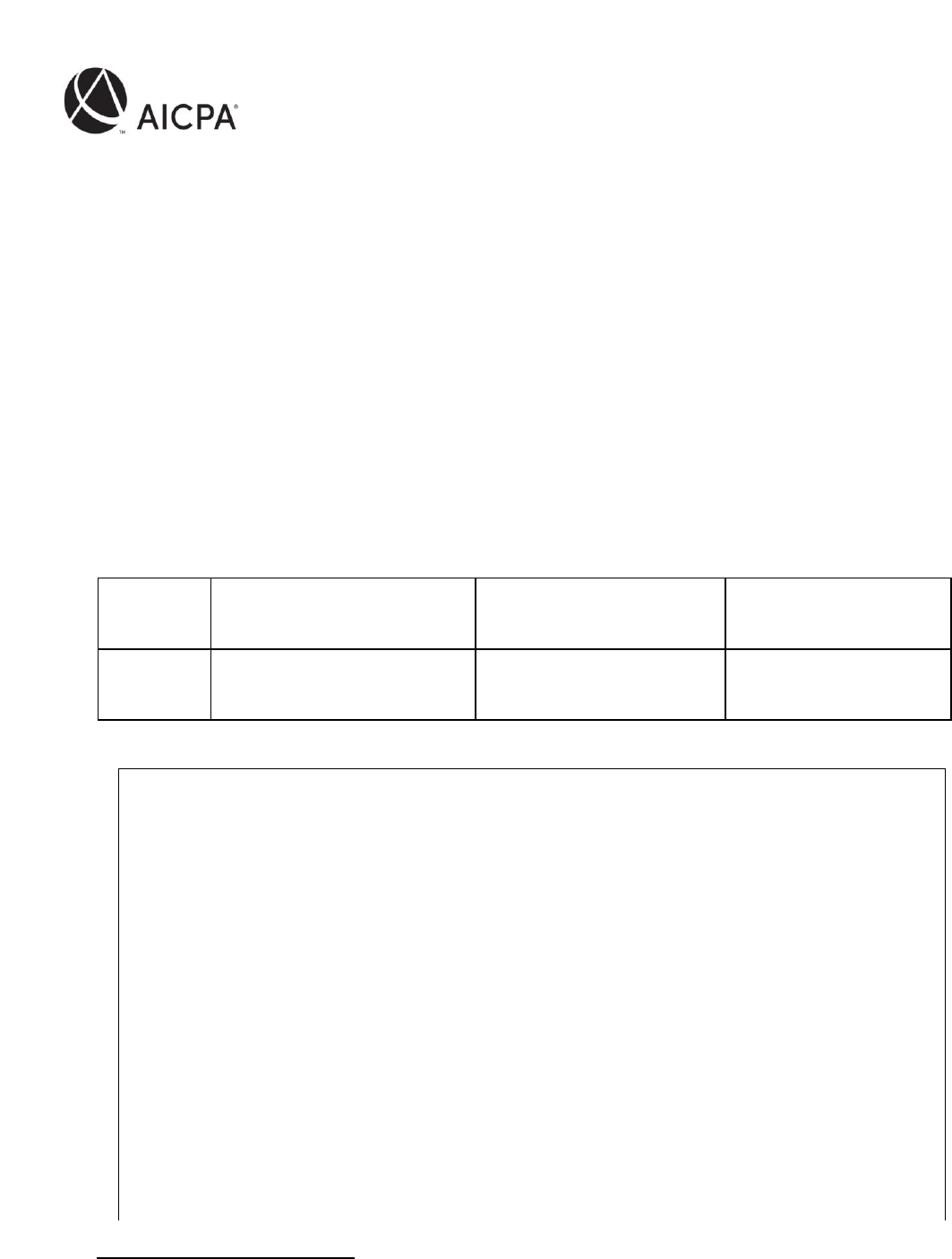
© 2021 AICPA. All rights reserved.
presented in compliance with the Department of Labor’s Rules and Regulations for Reporting and
Disclosure under ERISA.
26
[Signature of the auditor’s firm]
[City and state where the auditor’s report is issued]
[Date of the auditor’s report]
Illustration 1-9
Type of
plan
Current year (2021) – type of
audit
Prior year (2020) – type of
audit
Conditions
401(k)
Non-Section 103(a)(3)(C)
(unmodified opinion)
Full scope
(unmodified opinion)
Prior period audited by
predecessor auditor
Circumstances include the following:
• The auditor performed a non-Section 103(a)(3)(C) audit as of and for the year ended December
31, 2021 in accordance with GAAS. The auditor has implemented SAS Nos. 134−140 for the
December 31, 2021 plan year.
• The auditor has concluded that an unmodified (“clean”) opinion on the ERISA plan financial
statements is appropriate based on the audit evidence obtained.
• Predecessor auditors performed a full-scope audit and issued an unmodified opinion on the prior
year financial statements (for the year ended December 31, 2020).
• Paragraph .93 of AU-C section 703 addresses how to report when the prior period financial
statements are audited by a predecessor auditor.
• The report on the 2021 ERISA-required supplemental schedules is presented in a separate section
in accordance with paragraphs .129−.130 of AU-C section 703. The auditor has concluded that the
information in the 2021 ERISA-required supplemental schedules is fairly stated, in all material
respects, in relation to the financial statements as a whole, and the form and content are
26
See footnote 21.
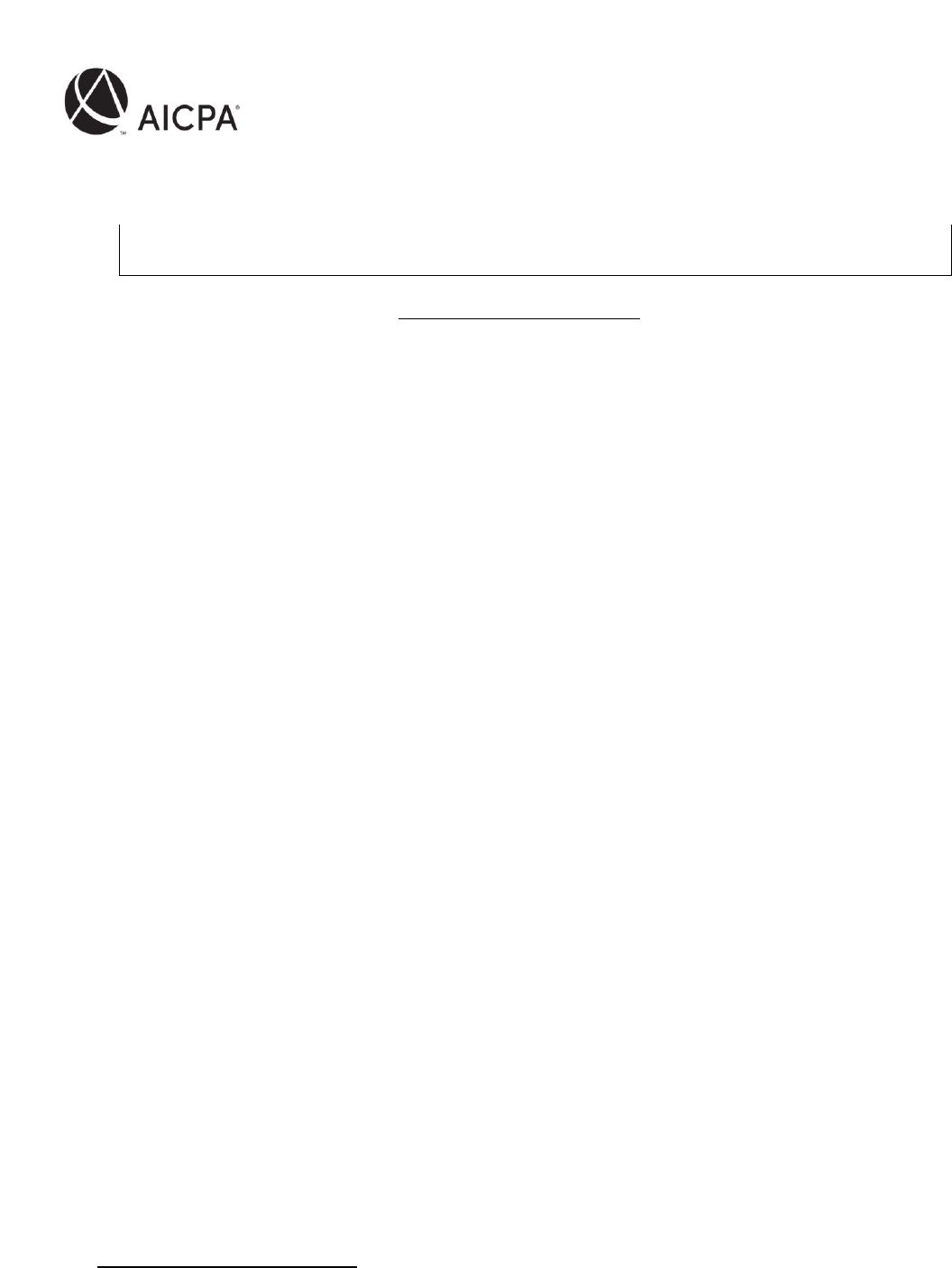
© 2021 AICPA. All rights reserved.
presented in conformity with the Department of Labor's Rules and Regulations for Reporting and
Disclosure under ERISA.
Independent Auditor’s Report
[Appropriate Addressee]
[Same “Opinion on the 2021 Financial Statements,” “Basis for the Opinion on the 2021 Financial
Statements,” “Responsibilities of Management for the 2021 Financial Statements,” and “Auditor’s
Responsibilities for the Audit of the 2021 Financial Statements,” sections as in illustration 1-3.]
2021 Supplemental Schedules Required by ERISA
27
Our audit was conducted for the purpose of forming an opinion on the financial statements as a
whole. The supplemental schedules of [identify title of supplemental schedules and periods covered]
are presented for purposes of additional analysis and are not a required part of the financial
statements but are supplementary information required by the Department of Labor’s Rules and
Regulations for Reporting and Disclosure under ERISA. Such information is the responsibility of
management and was derived from and relates directly to the underlying accounting and other
records used to prepare the financial statements. The information has been subjected to the
auditing procedures applied in the audits of the financial statements and certain additional
procedures, including comparing and reconciling such information directly to the underlying
accounting and other records used to prepare the financial statements or to the financial
statements themselves, and other additional procedures in accordance with GAAS.
In forming our opinion on the supplemental schedules, we evaluated whether the supplemental
schedules, including their form and content, are presented in conformity with the Department of
Labor’s Rules and Regulations for Reporting and Disclosure under ERISA.
In our opinion, the information in the accompanying schedules is fairly stated, in all material
respects, in relation to the financial statements as a whole, and the form and content are presented
in conformity with the Department of Labor’s Rules and Regulations for Reporting and Disclosure
under ERISA.
Other Matter
Auditor’s Report on the 2020 Financial Statements
The 2020 financial statements of ABC 401(k) Plan were audited by predecessor auditors whose
report dated [insert date of predecessor auditor’s report], expressed an unmodified opinion on those
financial statements and included an other-matter paragraph that provided an opinion that the
27
See footnote 8.

© 2021 AICPA. All rights reserved.
information in the 2020 supplemental schedules were fairly stated in all material respects in relation
to the financial statements as a whole.
28
[Signature of the auditor's firm]
[City and state where the auditor's report is issued]
[Date of the auditor's report]
____________________
28
See footnote 21.
